Just as the flowers bloom each spring, exciting new books blossom on the shelves. If you love to keep up with the buzziest new releases, you may already have a list of books you’re excited to read this spring. Get ready for your TBR to double in size, because this list of 2020 spring new releases is going to have you like:
via GIPHY
This list includes titles from all genres and for all ages, including series and standalone books, from well-known authors and debut authors. While not comprehensive, this list includes some of the most buzz-worthy and highly anticipated books hitting shelves in March, April, and May of 2020. Book descriptions come from Amazon, and those marked with an asterisk (*) are part of a series. Enjoy!
March 2020 Spring New Releases
Actress (March 3, W.W. Norton & Company) by Anne Enright
Katherine O’Dell is an Irish theater legend. As her daughter, Norah, retraces her mother’s celebrated career and bohemian life, she delves into long-kept secrets, both her mother’s and her own. Katherine began her career on Ireland’s bus-and-truck circuit before making it to London’s West End, Broadway, and finally Hollywood. Every moment of her life is a performance, with young Norah standing in the wings. But the mother-daughter romance cannot survive Katherine’s past or the world’s damage. With age, alcohol, and dimming stardom, Katherine’s grip on reality grows fitful. Fueled by a proud and long-simmering rage, she commits a bizarre crime.
As Norah’s role gradually changes to Katherine’s protector, caregiver, and finally legacy-keeper, she revisits her mother’s life of fiercely kept secrets; and Norah reveals in turn the secrets of her own sexual and emotional coming-of-age story. Her narrative is shaped by three braided searches―for her father’s identity; for her mother’s motive in donning a Chanel suit one morning and shooting a TV producer in the foot; and her own search for a husband, family, and work she loves.
Bringing to life two generations of women with difficult sexual histories, both assaulted and silenced, both finding ― or failing to find ― their powers of recovery, Actress touches a raw and timely nerve. With virtuosic storytelling and in prose at turns lyrical and knife-sharp, Enright takes readers to the heart of the maddening yet tender love that binds a mother and daughter.
 Anna K: A Love Story (March 3, Flatiron Books) by Jenny Lee
Anna K: A Love Story (March 3, Flatiron Books) by Jenny Lee
At seventeen, Anna K is at the top of Manhattan and Greenwich society (even if she prefers the company of her horses and dogs); she has the perfect (if perfectly boring) boyfriend, Alexander W.; and she has always made her Korean-American father proud (even if he can be a little controlling). Meanwhile, Anna’s brother, Steven, and his girlfriend, Lolly, are trying to weather a sexting scandal; Lolly’s little sister, Kimmie, is struggling to recalibrate to normal life after an injury derails her ice dancing career; and Steven’s best friend, Dustin, is madly (and one-sidedly) in love with Kimmie.
As her friends struggle with the pitfalls of ordinary teenage life, Anna always seems to be able to sail gracefully above it all. That is… until the night she meets Alexia “Count” Vronsky at Grand Central. A notorious playboy who has bounced around boarding schools and who lives for his own pleasure, Alexia is everything Anna is not. But he has never been in love until he meets Anna, and maybe she hasn’t, either. As Alexia and Anna are pulled irresistibly together, she has to decide how much of her life she is willing to let go for the chance to be with him. And when a shocking revelation threatens to shatter their relationship, she is forced to question if she has ever known herself at all.
Dazzlingly opulent and emotionally riveting, Anna K: A Love Story is a brilliant reimagining of Leo Tolstoy’s timeless love story, Anna Karenina—but above all, it is a novel about the dizzying, glorious, heart-stopping experience of first love and first heartbreak.
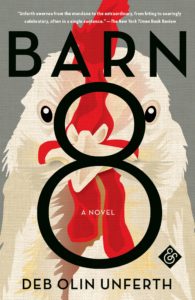 Barn 8 (March 3, Graywolf Press) by Deb Olin Unferth
Barn 8 (March 3, Graywolf Press) by Deb Olin Unferth
Two auditors for the U.S. egg industry go rogue and conceive a plot to steal a million chickens in the middle of the night ― an entire egg farm’s worth of animals. Janey and Cleveland ― a spirited former runaway and the officious head of audits ― assemble a precarious, quarrelsome team and descend on the farm on a dark spring evening. A series of catastrophes ensues.
Deb Olin Unferth’s wildly inventive novel is a heist story of a very unusual sort. Swirling with a rich array of voices, Barn 8 takes readers into the minds of these renegades: a farmer’s daughter, a former director of undercover investigations, hundreds of activists, a forest ranger who suddenly comes upon forty thousand hens, and a security guard who is left on an empty farm for years. There are glimpses twenty thousand years into the future to see what chickens might evolve into on our contaminated planet. We hear what hens think happens when they die. In the end the cracked hearts of these indelible characters, their earnest efforts to heal themselves, and their radical actions will lead them to ruin or revelation.
Funny, whimsical, philosophical, and heartbreaking, Barn 8 ultimately asks: What constitutes meaningful action in a world so in need of change? Unferth comes at this question with striking ingenuity, razor-sharp wit, and ferocious passion. Barn 8 is a rare comic-political drama, a tour de force for our time.
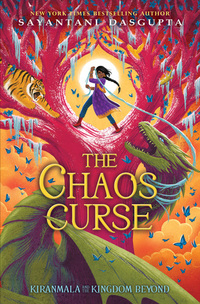 The Chaos Curse* (March 3, Scholastic) by Sayantani DasGupta
The Chaos Curse* (March 3, Scholastic) by Sayantani DasGupta
Kiranmala must leave the Kingdom Beyond and travel to her hometown of Parsippany to save Prince Lal, who has been spirited to the unlikeliest of places ― a tree in the yard of her best-enemy-for-life. She also faces evil serpents (of course!), plus a frightening prophecy about her role in the coming conflict between good and evil. Most troubling of all, though, is the way reality all around her seems to waver and flicker at odd moments. Could it be that the Anti-Chaos Committee’s efforts are causing a dangerous disruption in the multiverse?
Kiran must grapple with the increasingly tangled threads that threaten to ensnare her… and everyone in the world and the Kingdom Beyond.
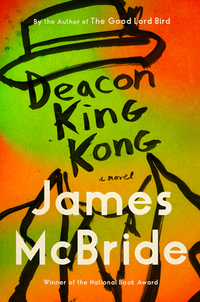 Deacon King Kong (March 3, Riverhead Books) by James McBride
Deacon King Kong (March 3, Riverhead Books) by James McBride
In September 1969, a fumbling, cranky old church deacon known as Sportcoat shuffles into the courtyard of the Cause Houses housing project in south Brooklyn, pulls a .38 from his pocket, and in front of everybody shoots the project’s drug dealer at point-blank range.
The reasons for this desperate burst of violence and the consequences that spring from it lie at the heart of Deacon King Kong, James McBride’s funny, moving novel and his first since his National Book Award-winning The Good Lord Bird. In Deacon King Kong, McBride brings to vivid life the people affected by the shooting: the victim, the African-American and Latinx residents who witnessed it, the white neighbors, the local cops assigned to investigate, the members of the Five Ends Baptist Church where Sportcoat was deacon, the neighborhood’s Italian mobsters, and Sportcoat himself.
As the story deepens, it becomes clear that the lives of the characters ― caught in the tumultuous swirl of 1960s New York ― overlap in unexpected ways. When the truth does emerge, McBride shows us that not all secrets are meant to be hidden, that the best way to grow is to face change without fear, and that the seeds of love lie in hope and compassion.
Bringing to these pages both his masterly storytelling skills and his abiding faith in humanity, James McBride has written a novel every bit as involving as The Good Lord Bird and as emotionally honest as The Color of Water. Told with insight and wit, Deacon King Kong demonstrates that love and faith live in all of us.
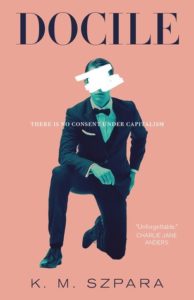 Docile (March 3, Tor.com) by K.M. Szpara
Docile (March 3, Tor.com) by K.M. Szpara
To be a Docile is to be kept, body and soul, for the uses of the owner of your contract. To be a Docile is to forget, to disappear, to hide inside your body from the horrors of your service. To be a Docile is to sell yourself to pay your parents’ debts and buy your children’s future.
Elisha Wilder’s family has been ruined by debt, handed down to them from previous generations. His mother never recovered from the Dociline she took during her term as a Docile, so when Elisha decides to try and erase the family’s debt himself, he swears he will never take the drug that took his mother from him.
Too bad his contract has been purchased by Alexander Bishop III, whose ultra-rich family is the brains (and money) behind Dociline and the entire Office of Debt Resolution. When Elisha refuses Dociline, Alex refuses to believe that his family’s crowning achievement could have any negative side effects ― and is determined to turn Elisha into the perfect Docile without it.
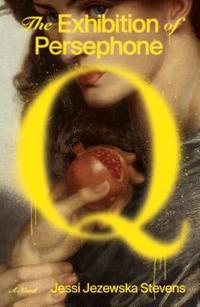 The Exhibition of Persephone Q (March 3, Farrar, Straus & Giroux) by Jessi Jezewska Stevens
The Exhibition of Persephone Q (March 3, Farrar, Straus & Giroux) by Jessi Jezewska Stevens
Percy is pregnant. She hasn’t told a soul. Probably she should tell her husband ― certainly she means to ― but one night she wakes up to find she no longer recognizes him. Now, instead of sleeping, Percy is spending her nights taking walks through her neighborhood, all the while fretting over her marriage, her impending motherhood, and the sinister ways the city is changing.
Amid this alienation ― from her husband, home, and rapidly changing body ― a package arrives. In it: an exhibition catalog for a photography show. The photographs consist of a series of digitally manipulated images of a woman lying on a bed in a red room. It takes a moment for even Percy to notice that the woman is herself… but no one else sees the resemblance.
Percy must now come to grips with the fundamental question of identity in the digital age: To what extent do we own our own image, and to what extent is that image shaped by the eyes of others?
Capturing perfectly the haunted atmosphere of Manhattan immediately after 9/11 ― and the simmering insanity of America ever since ― Jessi Jezewska Stevens’s The Exhibition of Persephone Q is a darkly witty satire about how easy it is to lose ownership of our own selves.
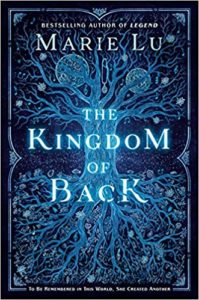 The Kingdom of Back (March 3, G.P. Putnam’s Sons) by Marie Lu
The Kingdom of Back (March 3, G.P. Putnam’s Sons) by Marie Lu
Two siblings. Two brilliant talents. But only one Mozart.
Born with a gift for music, Nannerl Mozart has just one wish ― to be remembered forever. But even as she delights audiences with her masterful playing, she has little hope she’ll ever become the acclaimed composer she longs to be. She is a young woman in 18th century Europe, and that means composing is forbidden to her. She will perform only until she reaches a marriageable age ― her tyrannical father has made that much clear.
And as Nannerl’s hope grows dimmer with each passing year, the talents of her beloved younger brother, Wolfgang, only seem to shine brighter. His brilliance begins to eclipse her own, until one day a mysterious stranger from a magical land appears with an irresistible offer. He has the power to make her wish come true ― but his help may cost her everything.
In her first work of historical fiction, #1 New York Times bestselling author Marie Lu spins a lush, lyrically-told story of music, magic, and the unbreakable bond between a brother and sister.
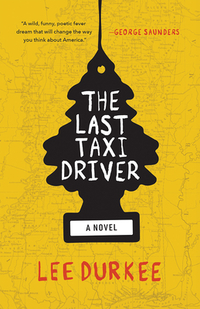 The Last Taxi Driver (March 3, Tin House Books) by Lee Durkee
The Last Taxi Driver (March 3, Tin House Books) by Lee Durkee
Written by a former cabbie, The Last Taxi Driver is a darkly comic novel about a middle-aged hackie’s daylong descent into madness, heartbreak, and murder. Lou ― a lapsed novelist and UFO aficionado ― drives 70-hour weeks for a ramshackle taxi company that operates on the outskirts of a north Mississippi college town among the trailer parks and housing projects. With Uber moving into town and his way of life fast vanishing, his girlfriend moving out on him, and his archenemy-dispatcher suddenly returning to the state on the lam, Lou must keep driving his way through a bedlam shift even when that means aiding and abetting the host of criminal misfits haunting the back seat of his Town Car. Shedding nuts and bolts at every turn, The Last Taxi Driver careens through the highways and back roads, from Mississippi to Memphis and back, as Lou becomes increasingly somnambulant and his fares increasingly eccentric. Equal parts Bukowski and Portis, Durkee’s novel is an homage to a dying American industry.
 The Magnificent Conman of Cairo (March 3, Hoopoe) by Adel Kamel, translated by Waleed Almusharaf
The Magnificent Conman of Cairo (March 3, Hoopoe) by Adel Kamel, translated by Waleed Almusharaf
Khaled, the spoiled idle son of a pasha, meets Mallim, carpenter’s apprentice and son of a scoundrel, when he comes to fix a broken window. In the course of his work, Mallim stumbles across a stash of money and dutifully hands it in. Khaled cooks up an overly elaborate plot to see that his dastardly father pays Mallim his due, but the plot backfires and Mallim is thrown in jail.
Khaled’s guilt over Mallim’s misfortune, made worse by his ridiculous attempts to defend him, result in a decisive moment: he breaks ties with his cruel and tyrannical father, seeking to leave behind the upper-class lifestyle he finds so suffocating.
They meet again years later, when Mallim has been released from prison and given up on earning an honest living. Khaled gets caught up in Mallim’s latest scam and is drawn into joining his cadre of eccentrics and failed artists living in a derelict Mamluk citadel.
With a sharp satirical voice Adel Kamal’s masterful novel is filled with compelling drama, vivid characters, and subtle humor.
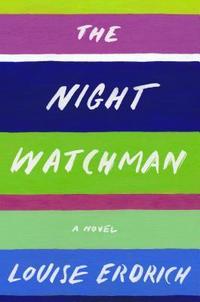 The Night Watchman (March 3, Harper) by Louise Erdrich
The Night Watchman (March 3, Harper) by Louise Erdrich
Thomas Wazhashk is the night watchman at the jewel bearing plant, the first factory located near the Turtle Mountain Reservation in rural North Dakota. He is also a Chippewa Council member who is trying to understand the consequences of a new “emancipation” bill on its way to the floor of the United States Congress. It is 1953 and he and the other council members know the bill isn’t about freedom; Congress is fed up with Indians. The bill is a “termination” that threatens the rights of Native Americans to their land and their very identity. How can the government abandon treaties made in good faith with Native Americans “for as long as the grasses shall grow, and the rivers run”?
Since graduating high school, Pixie Paranteau has insisted that everyone call her Patrice. Unlike most of the girls on the reservation, Patrice, the class valedictorian, has no desire to wear herself down with a husband and kids. She makes jewel bearings at the plant, a job that barely pays her enough to support her mother and brother. Patrice’s shameful alcoholic father returns home sporadically to terrorize his wife and children and bully her for money. But Patrice needs every penny to follow her beloved older sister, Vera, who moved to the big city of Minneapolis. Vera may have disappeared; she hasn’t been in touch in months, and is rumored to have had a baby. Determined to find Vera and her child, Patrice makes a fateful trip to Minnesota that introduces her to unexpected forms of exploitation and violence, and endangers her life.
In The Night Watchman, Louise Erdrich creates a fictional world populated with memorable characters who are forced to grapple with the worst and best impulses of human nature. Illuminating the loves and lives, the desires and ambitions of these characters with compassion, wit, and intelligence, The Night Watchman is a majestic work of fiction from this revered cultural treasure.
 Postcolonial Love Poem (March 3, Graywolf Press) by Natalie Diaz
Postcolonial Love Poem (March 3, Graywolf Press) by Natalie Diaz
Postcolonial Love Poem is an anthem of desire against erasure. Natalie Diaz’s brilliant second collection demands that every body carried in its pages ― bodies of language, land, rivers, suffering brothers, enemies, and lovers ― be touched and held as beloveds. Through these poems, the wounds inflicted by America onto an indigenous people are allowed to bloom pleasure and tenderness: “Let me call my anxiety, desire, then. / Let me call it, a garden.” In this new lyrical landscape, the bodies of indigenous, Latinx, black, and brown women are simultaneously the body politic and the body ecstatic. In claiming this autonomy of desire, language is pushed to its dark edges, the astonishing dunefields and forests where pleasure and love are both grief and joy, violence and sensuality.
Diaz defies the conditions from which she writes, a nation whose creation predicated the diminishment and ultimate erasure of bodies like hers and the people she loves: “I am doing my best to not become a museum / of myself. I am doing my best to breathe in and out. // I am begging: Let me be lonely but not invisible.” Postcolonial Love Poem unravels notions of American goodness and creates something more powerful than hope ― in it, a future is built, future being a matrix of the choices we make now, and in these poems, Diaz chooses love.
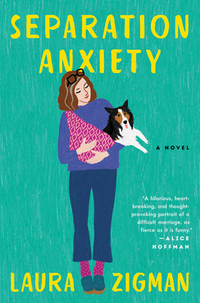 Separation Anxiety (March 3, Ecco) by Laura Zigman
Separation Anxiety (March 3, Ecco) by Laura Zigman
Judy never intended to start wearing the dog. But when she stumbled across her son Teddy’s old baby sling during a halfhearted basement cleaning, something in her snapped. So: the dog went into the sling, Judy felt connected to another living being, and she’s repeated the process every day since.
Life hasn’t gone according to Judy’s plan. Her career as a children’s book author offered a glimpse of success before taking an embarrassing nose dive. Teddy, now a teenager, treats her with some combination of mortification and indifference. Her best friend is dying. And her husband, Gary, has become a pot-addled professional “snackologist” who she can’t afford to divorce. On top of it all, she has a painfully ironic job writing articles for a self-help website — a poor fit for someone seemingly incapable of helping herself.
Wickedly funny and surprisingly tender, Separation Anxiety offers a frank portrait of middle-aged limbo, examining the ebb and flow of life’s most important relationships. Tapping into the insecurities and anxieties that most of us keep under wraps, and with a voice that is at once gleefully irreverent and genuinely touching, Laura Zigman has crafted a new classic for anyone taking fumbling steps toward happiness.
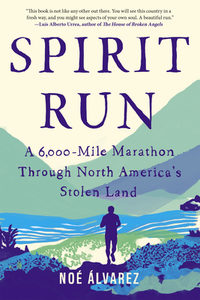 Spirit Run: A 6,000-Mile Marathon Through North America’s Stolen Land (March 3, Catapult) by Noé Álvarez
Spirit Run: A 6,000-Mile Marathon Through North America’s Stolen Land (March 3, Catapult) by Noé Álvarez
Growing up in Yakima, Washington, Noé Álvarez worked at an apple-packing plant alongside his mother, who “slouched over a conveyor belt of fruit, shoulder to shoulder with mothers conditioned to believe this was all they could do with their lives.” A university scholarship offered escape, but as a first-generation Latino college-goer, Álvarez struggled to fit in.
At nineteen, he learned about a Native American/First Nations movement called the Peace and Dignity Journeys, epic marathons meant to renew cultural connections across North America. He dropped out of school and joined a group of Dené, Secwépemc, Gitxsan, Dakelh, Apache, Tohono O’odham, Seri, Purépecha, and Maya runners, all fleeing difficult beginnings. Telling their stories alongside his own, Álvarez writes about a four-month-long journey from Canada to Guatemala that pushed him to his limits. He writes not only of overcoming hunger, thirst, and fear―dangers included stone-throwing motorists and a mountain lion―but also of asserting Indigenous and working-class humanity in a capitalist society where oil extraction, deforestation, and substance abuse wreck communities.
Running through mountains, deserts, and cities, and through the Mexican territory his parents left behind, Álvarez forges a new relationship with the land, and with the act of running, carrying with him the knowledge of his parents’ migration, and―against all odds in a society that exploits his body and rejects his spirit―the dream of a liberated future.
 These Ghosts are Family (March 3, Simon & Schuster) by Maisy Card
These Ghosts are Family (March 3, Simon & Schuster) by Maisy Card
Stanford Solomon has a shocking, thirty-year-old secret. And it’s about to change the lives of everyone around him. Stanford Solomon is actually Abel Paisley, a man who faked his own death and stole the identity of his best friend.
And now, nearing the end of his life, Stanford is about to meet his firstborn daughter, Irene Paisley, a home health aide who has unwittingly shown up for her first day of work to tend to the father she thought was dead.
These Ghosts Are Family revolves around the consequences of Abel’s decision and tells the story of the Paisley family from colonial Jamaica to present day Harlem. There is Vera, whose widowhood forced her into the role of single mother. There are two daughters and a granddaughter who have never known they are related. And there are others, like the house boy who loved Vera, whose lives might have taken different courses if not for Abel Paisley’s actions.
These Ghosts Are Family explores the ways each character wrestles with their ghosts and struggles to forge independent identities outside of the family and their trauma. The result is an engrossing portrait of a family and individuals caught in the sweep of history, slavery, migration, and the more personal dramas of infidelity, lost love, and regret. This electric and luminous family saga announces the arrival of a new American talent.
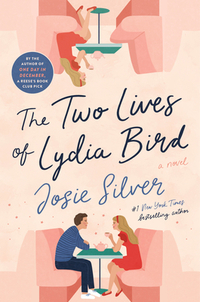 The Two Lives of Lydia Bird (March 3, Ballantine Books) by Josie Silver
The Two Lives of Lydia Bird (March 3, Ballantine Books) by Josie Silver
Lydia and Freddie. Freddie and Lydia. They’d been together for more than a decade and Lydia thought their love was indestructible. But she was wrong. On Lydia’s twenty-eighth birthday, Freddie died in a car accident.
So now it’s just Lydia, and all she wants is to hide indoors and sob until her eyes fall out. But Lydia knows that Freddie would want her to try to live fully, happily, even without him. So, enlisting the help of his best friend, Jonah, and her sister, Elle, she takes her first tentative steps into the world, open to life — and perhaps even love — again.
But then something inexplicable happens that gives her another chance at her old life with Freddie. A life where none of the tragic events of the past few months have happened.
Lydia is pulled again and again through the doorway to her past, living two lives, impossibly, at once. But there’s an emotional toll to returning to a world where Freddie, alive, still owns her heart. Because there’s someone in her new life, her real life, who wants her to stay.
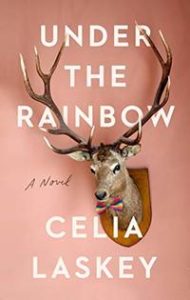 Under the Rainbow (March 3, Riverhead) by Celia Laskey
Under the Rainbow (March 3, Riverhead) by Celia Laskey
Big Burr, Kansas, is the kind of place where everyone seems to know everyone, and everyone shares the same values ― or keeps their opinions to themselves. But when a national nonprofit labels Big Burr “the most homophobic town in the US” and sends in a task force of queer volunteers as an experiment ― they’ll live and work in the community for two years in an attempt to broaden hearts and minds ― no one is truly prepared for what will ensue.
Furious at being uprooted from her life in Los Angeles and desperate to fit in at her new high school, Avery fears that it’s only a matter of time before her “gay crusader” mom outs her. Still grieving the death of her son, Linda welcomes the arrivals, who know mercifully little about her past. And for Christine, the newcomers are not only a threat to the comforting rhythms of Big Burr life, but a call to action. As tensions roil the town, cratering relationships and forcing closely guarded secrets into the light, everyone must consider what it really means to belong. Told with warmth and wit, Under the Rainbow is a poignant, hopeful articulation of our complicated humanity that reminds us we are more alike than we’d like to admit.
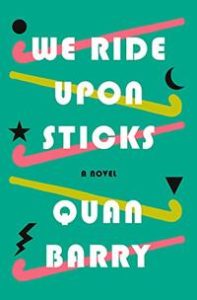 We Ride Upon Sticks (March 3, Pantheon Books) by Quan Barry
We Ride Upon Sticks (March 3, Pantheon Books) by Quan Barry
Acclaimed novelist Quan Barry delivers a tour de female force in this delightful novel. Set in the coastal town of Danvers, Massachusetts, where the accusations began that led to the 1692 witch trials, We Ride Upon Sticks follows the 1989 Danvers High School Falcons field hockey team, who will do anything to make it to the state finals — even if it means tapping into some devilishly dark powers. In chapters dense with 1980s iconography — from Heathers to “big hair” — Barry expertly weaves together the individual and collective progress of this enchanted team as they storm their way through an unforgettable season.
Helmed by good-girl captain Abby Putnam (a descendant of the infamous Salem accuser Ann Putnam) and her co-captain Jen Fiorenza (whose bleached blond “Claw” sees and knows all), the Falcons prove to be wily, original, and bold, flaunting society’s stale notions of femininity in order to find their glorious true selves through the crucible of team sport and, more importantly, friendship.
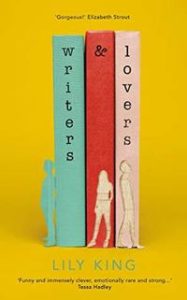 Writers & Lovers (March 3, Grove Press) by Lily King
Writers & Lovers (March 3, Grove Press) by Lily King
Blindsided by her mother’s sudden death, and wrecked by a recent love affair, Casey Peabody has arrived in Massachusetts in the summer of 1997 without a plan. Her mail consists of wedding invitations and final notices from debt collectors. A former child golf prodigy, she now waits tables in Harvard Square and rents a tiny, moldy room at the side of a garage where she works on the novel she’s been writing for six years. At thirty-one, Casey is still clutching onto something nearly all her old friends have let go of: the determination to live a creative life. When she falls for two very different men at the same time, her world fractures even more. Casey’s fight to fulfill her creative ambitions and balance the conflicting demands of art and life is challenged in ways that push her to the brink.
Writers & Lovers follows Casey ― a smart and achingly vulnerable protagonist ― in the last days of a long youth, a time when every element of her life comes to a crisis. Written with King’s trademark humor, heart, and intelligence, Writers & Lovers is a transfixing novel that explores the terrifying and exhilarating leap between the end of one phase of life and the beginning of another.
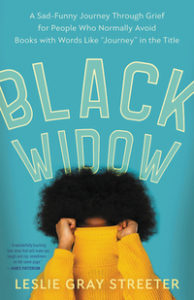 Black Widow: A Sad-Funny Journey Through Grief for People Who Normally Avoid Books with Words Like “Journey” in the Title (March 10, Little, Brown and Company) by Leslie Gray Streeter
Black Widow: A Sad-Funny Journey Through Grief for People Who Normally Avoid Books with Words Like “Journey” in the Title (March 10, Little, Brown and Company) by Leslie Gray Streeter
Leslie Gray Streeter is not cut out for widowhood. She’s not ready for hushed rooms and pitying looks. She is not ready to stand graveside, dabbing her eyes in a classy black hat. If she had her way she’d wear her favorite curve-hugging leopard print dress to Scott’s funeral; he loved her in that dress! But, here she is, having lost her soulmate to a sudden heart attack, totally unsure of how to navigate her new widow lifestyle. (“New widow lifestyle.” Sounds like something you’d find products for on daytime TV, like comfy track suits and compression socks. Wait, is a widow even allowed to make jokes?)
Looking at widowhood through the prism of race, mixed marriage, and aging, Black Widow redefines the stages of grief, from coffin shopping to day-drinking, to being a grown-ass woman crying for your mommy, to breaking up and making up with God, to facing the fact that life goes on even after the death of the person you were supposed to live it with. While she stumbles toward an uncertain future as a single mother raising a baby with her own widowed mother (plot twist!), Leslie looks back on her love story with Scott, recounting their journey through racism, religious differences, and persistent confusion about what kugel is. Will she find the strength to finish the most important thing that she and Scott started?
Tender, true, and endearingly hilarious, Black Widow is a story about the power of love, and how the only guide book for recovery is the one you write yourself.
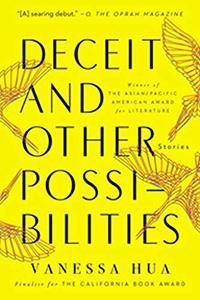 Deceit and Other Possibilities: Stories (March 10, Counterpoint) by Vanessa Hua
Deceit and Other Possibilities: Stories (March 10, Counterpoint) by Vanessa Hua
In her powerful collection, first published in 2016 and now featuring new stories, Vanessa Hua gives voice to immigrant families navigating a new America. Tied to their ancestral and adopted homelands in ways unimaginable in generations past, these memorable characters straddle both worlds but belong to none.
Veering between dream and disappointment, these stories shine a light on the conflict between self and society, tradition and change. From a Hong Kong movie idol fleeing a sex scandal to an obedient daughter turned Stanford pretender, from a Chinatown elder summoned to his village to a Korean American pastor with a secret agenda, the characters in the collection illustrate the conflict between self and society, tradition and change. In “What We Have Is What We Need,” winner of The Atlantic’s Student Writing Contest, a boy from Mexico reunites with his parents in San Francisco. When he suspects his mother has found love elsewhere, he fights to keep his family together.
With insight and wit, Hua writes about what wounds us and what we must survive. Deceit and Other Possibilities marked the emergence of a remarkable new writer and is now available more broadly.
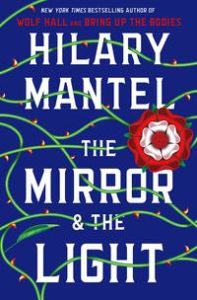 The Mirror and the Light* (March 10, Henry Holt & Company) by Hilary Mantel
The Mirror and the Light* (March 10, Henry Holt & Company) by Hilary Mantel
England, May 1536. Anne Boleyn is dead, decapitated in the space of a heartbeat by a hired French executioner. As her remains are bundled into oblivion, Thomas Cromwell breakfasts with the victors. The blacksmith’s son from Putney emerges from the spring’s bloodbath to continue his climb to power and wealth, while his formidable master, Henry VIII, settles to short-lived happiness with his third queen before Jane dies giving birth to the male heir he most craves.
Cromwell is a man with only his wits to rely on; he has no great family to back him, no private army. Despite rebellion at home, traitors plotting abroad and the threat of invasion testing Henry’s regime to the breaking point, Cromwell’s robust imagination sees a new country in the mirror of the future. But can a nation, or a person, shed the past like a skin? Do the dead continually unbury themselves? What will you do, the Spanish ambassador asks Cromwell, when the king turns on you, as sooner or later he turns on everyone close to him?
With The Mirror & the Light, Hilary Mantel brings to a triumphant close the trilogy she began with Wolf Hall and Bring Up the Bodies. She traces the final years of Thomas Cromwell, the boy from nowhere who climbs to the heights of power, offering a defining portrait of predator and prey, of a ferocious contest between present and past, between royal will and a common man’s vision: of a modern nation making itself through conflict, passion, and courage.
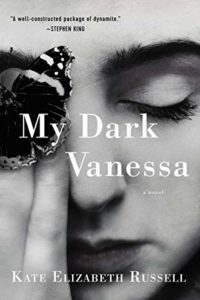 My Dark Vanessa (March 10, William Morrow) by Kate Elizabeth Russell
My Dark Vanessa (March 10, William Morrow) by Kate Elizabeth Russell
2000. Bright, ambitious, and yearning for adulthood, fifteen-year-old Vanessa Wye becomes entangled in an affair with Jacob Strane, her magnetic and guileful forty-two-year-old English teacher.
2017. Amid the rising wave of allegations against powerful men, a reckoning is coming due. Strane has been accused of sexual abuse by a former student, who reaches out to Vanessa, and now Vanessa suddenly finds herself facing an impossible choice: remain silent, firm in the belief that her teenage self willingly engaged in this relationship, or redefine herself and the events of her past. But how can Vanessa reject her first love, the man who fundamentally transformed her and has been a persistent presence in her life? Is it possible that the man she loved as a teenager — and who professed to worship only her — may be far different from what she has always believed?
Alternating between Vanessa’s present and her past, My Dark Vanessa juxtaposes memory and trauma with the breathless excitement of a teenage girl discovering the power her own body can wield. Thought-provoking and impossible to put down, this is a masterful portrayal of troubled adolescence and its repercussions that raises vital questions about agency, consent, complicity, and victimhood. Written with the haunting intimacy of The Girls and the creeping intensity of Room, My Dark Vanessa is an era-defining novel that brilliantly captures and reflects the shifting cultural mores transforming our relationships and society itself.
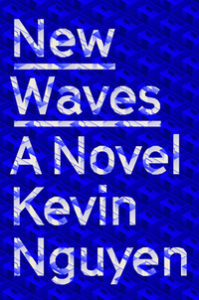 New Waves (March 10, One World) by Kevin Nguyen
New Waves (March 10, One World) by Kevin Nguyen
Lucas and Margo are fed up. Margo is a brilliant programmer tired of being talked over as the company’s sole black employee, and while Lucas is one of many Asians at the firm, he’s nearly invisible as a low-paid customer service rep. Together, they decide to steal their tech startup’s user database in an attempt at revenge. The heist takes a sudden turn when Margo dies in a car accident, and Lucas is left reeling, wondering what to do with their secret — and wondering whether her death really was an accident. When Lucas hacks into Margo’s computer looking for answers, he is drawn into her private online life and realizes just how little he knew about his best friend.
With a fresh voice, biting humor, and piercing observations about human nature, Kevin Nguyen brings an insider’s knowledge of the tech industry to this imaginative novel. A pitch-perfect exploration of race and startup culture, secrecy and surveillance, social media and friendship, New Waves asks: How well do we really know one another? And how do we form true intimacy and connection in a tech-obsessed world?
 The Perfect World of Miwako Sumida (March 10, Soho Press) by Clarissa Goenawan
The Perfect World of Miwako Sumida (March 10, Soho Press) by Clarissa Goenawan
University sophomore Miwako Sumida has hanged herself, leaving those closest to her reeling. In the months before her suicide, she was hiding away in a remote mountainside village, but what, or whom, was she running from?
Ryusei, a fellow student at Waseda who harbored unrequited feelings for Miwako, begs her best friend Chie to bring him to the remote village where she spent her final days. While they are away, his older sister, Fumi, who took Miwako on as an apprentice in her art studio, receives an unexpected guest at her apartment in Tokyo, distracting her from her fear that Miwako’s death may ruin what is left of her brother’s life.
Expanding on the beautifully crafted world of Rainbirds, Clarissa Goenawan gradually pierces through a young woman’s careful façade, unmasking her most painful secrets.
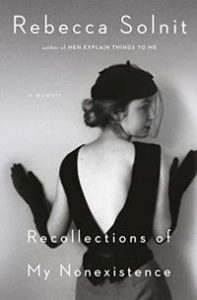 Recollections of My Nonexistence: A Memoir (March 10, Viking) by Rebecca Solnit
Recollections of My Nonexistence: A Memoir (March 10, Viking) by Rebecca Solnit
In Recollections of My Nonexistence, Rebecca Solnit describes her formation as a writer and as a feminist in 1980s San Francisco, in an atmosphere of gender violence on the street and throughout society and the exclusion of women from cultural arenas. She tells of being poor, hopeful, and adrift in the city that became her great teacher; of the small apartment that, when she was nineteen, became the home in which she transformed herself; of how punk rock gave form and voice to her own fury and explosive energy.
Solnit recounts how she came to recognize the epidemic of violence against women around her, the street harassment that unsettled her, the trauma that changed her, and the authority figures who routinely disdained and disbelieved girls and women, including her. Looking back, she sees all these as consequences of the voicelessness that was and still is the ordinary condition of women, and how she contended with that while becoming a writer and a public voice for women’s rights.
She explores the forces that liberated her as a person and as a writer — books themselves, the gay men around her who offered other visions of what gender, family, and joy could be, and her eventual arrival in the spacious landscapes and overlooked conflicts of the American West. These influences taught her how to write in the way she has ever since, and gave her a voice that has resonated with and empowered many others.
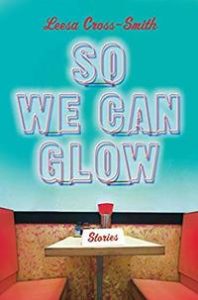 So We Can Glow: Stories (March 10, Grand Central Publishing) by Leesa Cross-Smith
So We Can Glow: Stories (March 10, Grand Central Publishing) by Leesa Cross-Smith
From Kentucky to the California desert, these forty-two short stories expose the hearts of girls and women in moments of obsessive desire and fantasy, wildness and bad behavior, brokenness and fearlessness, and more.
On a hot July night, teenage girls sneak out of the house to meet their boyfriends by the train tracks. Members of a cult form an unsettling chorus as they proclaim their adoration for the same man. A woman luxuriates in a fantasy getaway to escape her past. A love story begins over cabbages in a grocery store, and a laundress’s life is consumed by her obsession with a baseball star. After the death of a sister, two high school friends kiss all night and binge-watch Winona Ryder movies.
Leesa Cross-Smith’s sensuous stories — some long, some gone in a flash, some told over text and emails — drench readers in nostalgia for summer nights and sultry days. They recall the intense friendships of teenage girls and the innate bonds between mothers, the first heady rush of desire, and the pure exhilaration of womanhood, all while holding up the wild souls of women so they can catch the light.
 Beheld (March 17, Bloomsbury) by TaraShea Nesbit
Beheld (March 17, Bloomsbury) by TaraShea Nesbit
Ten years after the Mayflower pilgrims arrived on rocky, unfamiliar soil, Plymouth is not the land its residents had imagined. Seemingly established on a dream of religious freedom, in reality the town is led by fervent puritans who prohibit the residents from living, trading, and worshipping as they choose. By the time an unfamiliar ship, bearing new colonists, appears on the horizon one summer morning, Anglican outsiders have had enough.
With gripping, immersive details and exquisite prose, TaraShea Nesbit reframes the story of the pilgrims in the previously unheard voices of two women of very different status and means. She evokes a vivid, ominous Plymouth, populated by famous and unknown characters alike, each with conflicting desires and questionable behavior.
Suspenseful and beautifully wrought, Beheld is about a murder and a trial, and the motivations ― personal and political ― that cause people to act in unsavory ways. It is also an intimate portrait of love, motherhood, and friendship that asks: Whose stories get told over time, who gets believed―and subsequently, who gets punished?
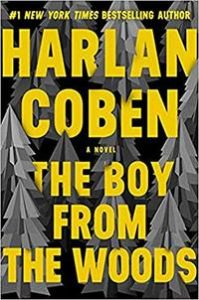 The Boy From the Woods (March 17, Grand Central) by Harlan Coben
The Boy From the Woods (March 17, Grand Central) by Harlan Coben
Thirty years ago, Wilde was found as a boy living feral in the woods, with no memory of his past. Now an adult, he still doesn’t know where he comes from, and another child has gone missing.
No one seems to take Naomi Pine’s disappearance seriously, not even her father — with one exception. Hester Crimstein, a television criminal attorney, knows through her grandson that Naomi was relentlessly bullied at school. Hester asks Wilde — with whom she shares a tragic connection — to use his unique skills to help find Naomi.
Wilde can’t ignore an outcast in trouble, but in order to find Naomi he must venture back into the community where he has never fit in, a place where the powerful are protected even when they harbor secrets that could destroy the lives of millions… secrets that Wilde must uncover before it’s too late.
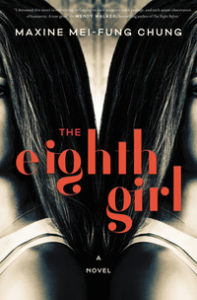 The Eighth Girl (March 17, William Morrow) by Maxine Mei-Fung Chung
The Eighth Girl (March 17, William Morrow) by Maxine Mei-Fung Chung
Beautiful. Damaged. Destructive. Meet Alexa Wú, a brilliant yet darkly self-aware young woman whose chaotic life is manipulated and controlled by a series of alternate personalities. Only three people know about their existence: her shrink Daniel; her stepmother Anna; and her enigmatic best friend Ella. The perfect trio of trust.
When Ella gets a job at a high-end gentlemen’s club, she catches the attention of its shark-like owner and is gradually drawn into his inner circle. As Alexa’s world becomes intimately entangled with Ella’s, she soon finds herself the unwitting keeper of a nightmarish secret. With no one to turn to and lives at stake, she follows Ella into London’s cruel underbelly on a daring rescue mission. Threatened and vulnerable, Alexa will discover whether her multiple personalities are her greatest asset, or her most dangerous obstacle.
Electrifying and breathlessly compulsive, The Eighth Girl is an omnivorous examination of life with mental illness and the acute trauma of life in a misogynist world. With engaging prose and a clinician’s expertise, Chung’s psychological debut deftly navigates the swirling confluence of identity, innocence, and the impossible fracturing weights that young women are forced to carry, causing us to question: Does the truth lead to self-discovery, or self-destruction?
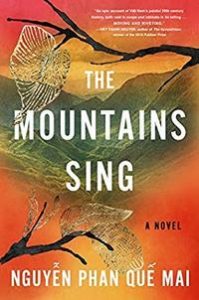 The Mountains Sing (March 17, Algonquin) by Nguyễn Phan Quế Mai
The Mountains Sing (March 17, Algonquin) by Nguyễn Phan Quế Mai
With the epic sweep of Min Jin Lee’s Pachinko or Yaa Gyasi’s Homegoing and the lyrical beauty of Vaddey Ratner’s In the Shadow of the Banyan, The Mountains Sing tells an enveloping, multigenerational tale of the Trần family, set against the backdrop of the Việt Nam War. Trần Diệu Lan, who was born in 1920, was forced to flee her family farm with her six children during the Land Reform as the Communist government rose in the North. Years later in Hà Nội, her young granddaughter, Hương, comes of age as her parents and uncles head off down the Hồ Chí Minh Trail to fight in a conflict that tore not just her beloved country, but her family apart.
Vivid, gripping, and steeped in the language and traditions of Việt Nam, The Mountains Sing brings to life the human costs of this conflict from the point of view of the Vietnamese people themselves, while showing us the true power of kindness and hope.
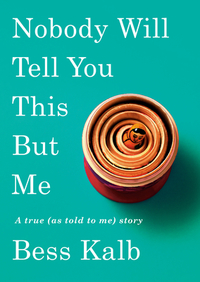 Nobody Will Tell You This But Me: A True (As Told to Me) Story (March 17, Knopf) by Bess Kalb
Nobody Will Tell You This But Me: A True (As Told to Me) Story (March 17, Knopf) by Bess Kalb
Bess Kalb, Emmy-nominated TV writer and New Yorker contributor, saved every voicemail her grandmother Bobby Bell ever left her. Bobby was a force—irrepressible, glamorous, unapologetically opinionated. Bobby doted on Bess; Bess adored Bobby. Then, at ninety, Bobby died. But in this debut memoir, Bobby is speaking to Bess once more, in a voice as passionate as it ever was in life.
Recounting both family lore and family secrets, Bobby brings us four generations of indomitable women and the men who loved them. There’s Bobby’s mother, who traveled solo from Belarus to America in the 1880s to escape the pogroms, and Bess’s mother, a 1970s rebel who always fought against convention. Then there’s Bess, who grew up in New York and entered the rough-and-tumble world of L.A. television. Her grandma Bobby was with her all the way — she was the light of Bess’s childhood and her fiercest supporter, giving Bess unequivocal love, even if sometimes of the toughest kind.
With humor and poignancy, Bess Kalb gives us proof of the special bond that can skip a generation and endure beyond death. This book is a feat of extraordinary ventriloquism and imagination by a remarkably talented writer.
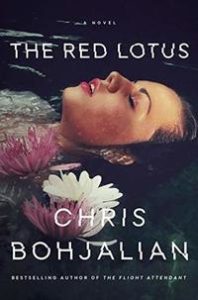 The Red Lotus (March 17, Doubleday) by Chris Bohjalian
The Red Lotus (March 17, Doubleday) by Chris Bohjalian
The first time Alexis saw Austin, it was a Saturday night. Not in a bar, but in the emergency room where Alexis sutured a bullet wound in Austin’s arm. Six months later, on the brink of falling in love, they travel to Vietnam on a bike tour so that Austin can show her his passion for cycling and he can pay his respects to the place where his father and uncle fought in the war. But as Alexis sips white wine and waits at the hotel for him to return from his solo ride, two men emerge from the tall grass and Austin vanishes into thin air. The only clue he leaves behind is a bright yellow energy gel dropped on the road. As Alexis grapples with this bewildering loss, and deals with the FBI, Austin’s prickly family, and her colleagues at the hospital, Alexis uncovers a series of strange lies that force her to wonder: Where did Austin go? Why did he really bring her to Vietnam? And how much danger has he left her in? Set amidst the adrenaline-fueled world of the emergency room, The Red Lotus is a global thriller about those who dedicate their lives to saving people, and those who peddle death to the highest bidder.
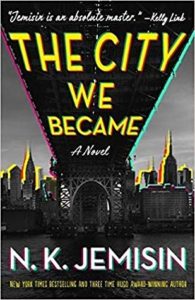 The City We Became* (March 24, Orbit) by N.K. Jemisin
The City We Became* (March 24, Orbit) by N.K. Jemisin
Every great city has a soul. Some are as ancient as myths, and others are as new and destructive as children. New York City? She’s got six.
But every city also has a dark side. A roiling, ancient evil stirs in the halls of power, threatening to destroy the city and her six newborn avatars unless they can come together and stop it once and for all.
 Enter the Aardvark (March 24, Little, Brown and Company) by Jessica Anthony
Enter the Aardvark (March 24, Little, Brown and Company) by Jessica Anthony
Early one morning on a hot day in August, millennial Congress-bro Alexander Paine Wilson (R) is planning his reelection campaign when a mysterious FedEx delivery arrives at his townhouse. Inside is a gigantic taxidermied aardvark. What does it mean?
To find out, this outrageous, edge-of-your-seat novel hurtles between present day Washington, DC, where Wilson tries to get rid of the unsightly beast before it destroys his career, and Victorian England, where we meet the aardvark’s taxidermist and the naturalist who hunted her — and learn the secret that binds them all.
More than a ghost story, a love story, or even a political satire, Enter the Aardvark is a stunningly prescient exploration of the consequences for all of us when repressed male love meets oppressive male power. It is also that rarest of creatures: a work of art so utterly original and masterfully built that it seems to have sprung fully formed from its visionary maker’s head.
 The Glass Hotel (March 24, Knopf) by Emily St. John Mandel
The Glass Hotel (March 24, Knopf) by Emily St. John Mandel
Vincent is a bartender at the Hotel Caiette, a five-star hotel on the northernmost tip of Vancouver Island. On the night she meets Jonathan Alkaitis, a hooded figure scrawls a message on the lobby’s glass wall: “Why don’t you swallow broken glass.” Leon Prevant, a shipping executive for Neptune-Avradimis, reads the words and orders a drink to calm down. Alkaitis, the owner of the hotel and a wealthy investment manager, arrives too late to read the threat, never knowing it was intended for him. He leaves Vincent a hundred dollar tip along with his business card, and a year later they are living together as husband and wife.
High above Manhattan, a greater crime is committed: Alkaitis is running an international Ponzi scheme, moving imaginary sums of money through clients’ accounts. He holds the life savings of an artist named Olivia Collins, the fortunes of a Saudi prince and his extended family, and countless retirement funds, including Leon Prevant’s. The collapse of the financial empire is as swift as it is devastating, obliterating fortunes and lives, while Vincent walks away into the night. Until, years later, she steps aboard a Neptune-Avramidis vessel, the Neptune Cumberland, and disappears from the ship between ports of call.
In this captivating story of crisis and survival, Emily St. John Mandel takes readers through often hidden landscapes: campgrounds for the near-homeless, underground electronica clubs, the business of international shipping, service in luxury hotels, and life in a federal prison. Rife with unexpected beauty, The Glass Hotel is a captivating portrait of greed and guilt, love and delusion, ghosts and unintended consequences, and the infinite ways we search for meaning in our lives.
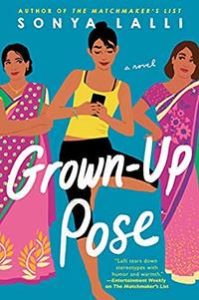 Grown-Up Pose (March 24, Berkley) by Sonya Lalli
Grown-Up Pose (March 24, Berkley) by Sonya Lalli
Adulting shouldn’t be this hard. Especially in your thirties. Having been pressured by her tight-knit community to get married at a young age to her first serious boyfriend, Anu Desai is now on her own again and feels like she is starting from the beginning.
But Anu doesn’t have time to start over. Telling her parents that she was separating from her husband was the hardest thing she’s ever done — and she’s still dealing with the fallout. She has her young daughter to support and when she invests all of her savings into running her own yoga studio, the feelings of irresponsibility send Anu reeling. She’ll be forced to look inside herself to learn what she truly wants.
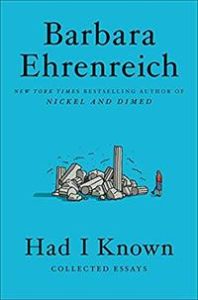 Had I Known: Collected Essays (March 24, Twelve) by Barbara Ehrenreich
Had I Known: Collected Essays (March 24, Twelve) by Barbara Ehrenreich
A self-proclaimed “myth buster by trade,” Barbara Ehrenreich has covered an extensive range of topics as a journalist and political activist, and is unafraid to dive into intellectual waters that others deem too murky. Now, Had I Known gathers the articles and excerpts from a long-ranging career that most highlight Ehrenreich’s brilliance, social consciousness, and wry wit.
From Ehrenreich’s award-winning article “Welcome to Cancerland,” published shortly after she was diagnosed with breast cancer, to her groundbreaking undercover investigative journalism in Nickel and Dimed, to her exploration of death and mortality in the New York Times bestseller Natural Causes, Barbara Ehrenreich has been writing radical, thought-provoking, and worldview-altering pieces for over four decades. Had I Known pulls from the vast and varied collection of one of our country’s most incisive thinkers to create one must-have volume.
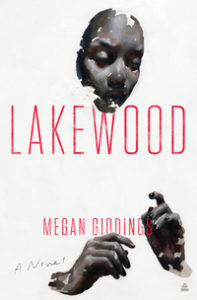 Lakewood (March 24, Amistad) by Megan Giddings
Lakewood (March 24, Amistad) by Megan Giddings
When Lena Johnson’s beloved grandmother dies, and the full extent of the family debt is revealed, the black millennial drops out of college to support her family and takes a job in the mysterious and remote town of Lakewood, Michigan.
On paper, her new job is too good to be true. High paying. No out of pocket medical expenses. A free place to live. All Lena has to do is participate in a secret program — and lie to her friends and family about the research being done in Lakewood. An eye drop that makes brown eyes blue, a medication that could be a cure for dementia, golden pills promised to make all bad thoughts go away.
The discoveries made in Lakewood, Lena is told, will change the world — but the consequences for the subjects involved could be devastating. As the truths of the program reveal themselves, Lena learns how much she’s willing to sacrifice for the sake of her family.
Provocative and thrilling, Lakewood is a breathtaking novel that takes an unflinching look at the moral dilemmas many working-class families face, and the horror that has been forced on black bodies in the name of science.
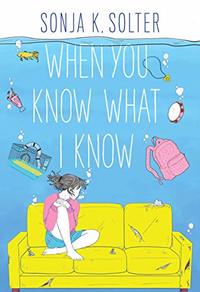 When You Know What I Know (March 24, Little, Brown Books) by Sonja K. Solter
When You Know What I Know (March 24, Little, Brown Books) by Sonja K. Solter
One day after school, on the couch in the basement, Tori’s uncle did something bad. Afterward, Tori tells her mom. Even though telling was a brave thing to do, her mom still doesn’t believe her at first. Her grandma still takes his side. And Tori doesn’t want anyone else — even her best friend — to know what happened.
Now Tori finds herself battling mixed emotions — anger, shame, and sadness — as she deals with the trauma. But with the help of her mom, her little sister, her best friend, and others, can Tori find a way to have the last word?
From debut author Sonja K. Solter comes a heartbreaking yet powerful novel that will strike a chord with readers of Jacqueline Woodson and Tony Abbott.
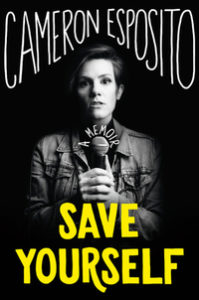 Save Yourself (March 24, Grand Central) by Cameron Esposito
Save Yourself (March 24, Grand Central) by Cameron Esposito
It’s Cameron Esposito and she — weighed down by Catholic guilt — immediately topples over. But like any scrappy protagonist with all the odds (and the Pope) stacked against them, she’s able to pick herself up.
Now she would like to tell the whole queer as hell story. Her story. Not the sidebar to a straight person’s rebirth — she doesn’t give a makeover or plan a wedding or get a couple back together. This isn’t a queer tragedy. She doesn’t die at the end of this book, having finally decided to kiss the girl. It’s the sexy, honest, bumpy, and triumphant dyke’s tale her younger, wasn’t-allowed-to-watch-Ellen self needed to read. Because there was a long time when she thought she wouldn’t make it. Not as a comic, but as a human.
Save Yourself is full of funny and insightful recollections about everything from coming out (at a Catholic college where sexual orientation wasn’t in the nondiscrimination policy) to how joining the circus can help you become a better comic (so much nudity) to accepting yourself for who you are — even if you’re, say, a bowl cut-sporting, bespectacled, gender-nonconforming child with an eye patch (which Cameron was). Packed with heart, humor, and cringeworthy stories anyone who has gone through puberty, fallen in love, started a career, or had period sex in Rome can relate to, Cameron’s memoir is for that timid, fenced-in kid in all of us-and the fearless stand-up yearning to break free.
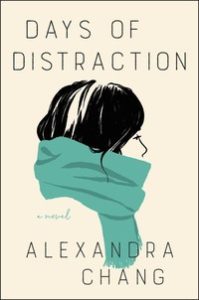 Days of Distraction (March 31, Ecco) by Alexandra Chang
Days of Distraction (March 31, Ecco) by Alexandra Chang
The plan is to leave. As for how, when, to where, and even why — she doesn’t know yet. So begins a journey for the twenty-four-year-old narrator of Days of Distraction. As a staff writer at a prestigious tech publication, she reports on the achievements of smug Silicon Valley billionaires and start-up bros while her own request for a raise gets bumped from manager to manager. And when her longtime boyfriend, J, decides to move to a quiet upstate New York town for grad school, she sees an excuse to cut and run.
Moving is supposed to be a grand gesture of her commitment to J and a way to reshape her sense of self. But in the process, she finds herself facing misgivings about her role in an interracial relationship. Captivated by the stories of her ancestors and other Asian Americans in history, she must confront a question at the core of her identity: What does it mean to exist in a society that does not notice or understand you?
Equal parts tender and humorous, and told in spare but powerful prose, Days of Distraction is an offbeat coming-of-adulthood tale, a touching family story, and a razor-sharp appraisal of our times.
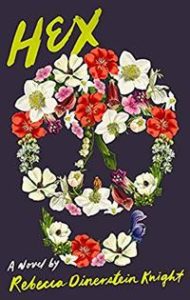 Hex (March 31, Viking) by Rebecca Dinerstein Knight
Hex (March 31, Viking) by Rebecca Dinerstein Knight
Nell Barber, an expelled PhD candidate in biological science, is exploring the fine line between poison and antidote, working alone to set a speed record for the detoxification of poisonous plants. Her mentor, Dr. Joan Kallas, is the hero of Nell’s heart. Nell frequently finds herself standing in the doorway to Joan’s office despite herself, mesmerized by Joan’s elegance, success, and spiritual force.
Surrounded by Nell’s ex, her best friend, her best friend’s boyfriend, and Joan’s buffoonish husband, the two scientists are tangled together at the center of a web of illicit relationships, grudges, and obsessions. All six are burdened by desire and ambition, and as they collide on the university campus, their attractions set in motion a domino effect of affairs and heartbreak.
Meanwhile, Nell slowly fills her empty apartment with poisonous plants to study, and she begins to keep a series of notebooks, all dedicated to Joan. She logs her research and how she spends her days, but the notebooks ultimately become a painstaking map of love. In a dazzling and unforgettable voice, Rebecca Dinerstein Knight has written a spellbinding novel of emotional and intellectual intensity.
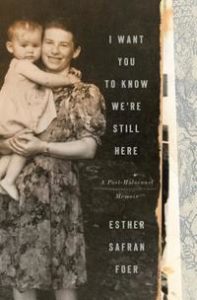 I Want You to Know We’re Still Here: A Post-Holocaust Memoir (March 31, Tim Duggan Books) by Esther Safran Foer
I Want You to Know We’re Still Here: A Post-Holocaust Memoir (March 31, Tim Duggan Books) by Esther Safran Foer
Esther Safran Foer grew up in a home where the past was too terrible to speak of. The child of parents who were each the sole survivors of their respective families, for Esther the Holocaust loomed in the backdrop of daily life, felt but never discussed. The result was a childhood marked by painful silences and continued tragedy. Even as she built a successful career, married, and raised three children, Esther always felt herself searching.
So when Esther’s mother casually mentions an astonishing revelation — that her father had a previous wife and daughter, both killed in the Holocaust — Esther resolves to find out who they were, and how her father survived. Armed with only a black-and-white photo and a hand-drawn map, she travels to Ukraine, determined to find the shtetl where her father hid during the war. What she finds reshapes her identity and gives her the opportunity to finally mourn.
I Want You to Know We’re Still Here is the poignant and deeply moving story not only of Esther’s journey but of four generations living in the shadow of the Holocaust. They are four generations of survivors, storytellers, and memory keepers, determined not just to keep the past alive but to imbue the present with life and more life.
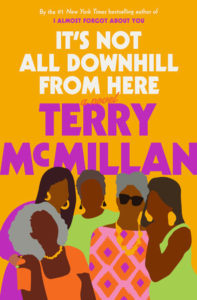 It’s Not All Downhill From Here (March 31, Ballantine Books) by Terry McMillan
It’s Not All Downhill From Here (March 31, Ballantine Books) by Terry McMillan
Loretha Curry’s life is full. A little crowded sometimes, but full indeed. On the eve of her sixty-eighth birthday, she has a booming beauty-supply empire, a gaggle of lifelong friends, and a husband whose moves still surprise. True, she’s carrying a few more pounds than she should be, but Loretha is not one of those women who think her best days are behind her — and she’s determined to prove wrong her mother, her twin sister, and everyone else with that outdated view of aging wrong. It’s not all downhill from here.
But when an unexpected loss turns her world upside down, Loretha will have to summon all her strength, resourcefulness, and determination to keep on thriving, pursue joy, heal old wounds, and chart new paths. With a little help from her friends, of course.
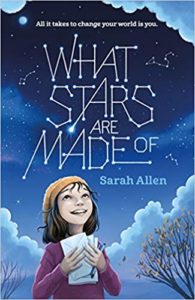 What Stars Are Made Of (March 31, Farrar, Straus & Giroux) by Sarah Allen
What Stars Are Made Of (March 31, Farrar, Straus & Giroux) by Sarah Allen
Twelve-year-old Libby Monroe is great at science, being optimistic, and talking to her famous, accomplished friends (okay, maybe that last one is only in her head). She’s not great at playing piano, sitting still, or figuring out how to say the right thing at the right time in real life. Libby was born with Turner Syndrome, and that makes some things hard. But she has lots of people who love her, and that makes her pretty lucky.
When her big sister Nonny tells her she’s pregnant, Libby is thrilled ― but worried. Nonny and her husband are in a financial black hole, and Libby knows that babies aren’t always born healthy. So she strikes a deal with the universe: She’ll enter a contest with a project about Cecelia Payne, the first person to discover what stars are made of. If she wins the grand prize and gives all that money to Nonny’s family, then the baby will be perfect. Does she have what it takes to care for the sister that has always cared for her? And what will it take for the universe to notice?
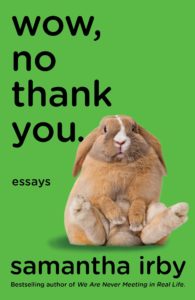 Wow, No Thank You (March 31, Vintage) by Samantha Irby
Wow, No Thank You (March 31, Vintage) by Samantha Irby
Irby is forty, and increasingly uncomfortable in her own skin despite what Inspirational Instagram Infographics have promised her. She has left her job as a receptionist at a veterinary clinic, has published successful books, and has been friendzoned by Hollywood, left Chicago, and moved into a house with a garden that requires repairs and know-how with her wife in a Blue town in the middle of a Red state where she now hosts book clubs and makes mason jar salads. This is the bourgeois life of a Hallmark Channel dream. She goes on bad dates with new friends, spends weeks in Los Angeles taking meetings with “TV executives slash amateur astrologers” while being a “cheese fry-eating slightly damp Midwest person,” “with neck pain and no cartilage in [her] knees,” who still hides past due bills under her pillow. The essays in this collection draw on the raw, hilarious particulars of Irby’s new life. Wow, No Thank You is Irby at her most unflinching, riotous, and relatable.
April 2020 Spring New Book Releases
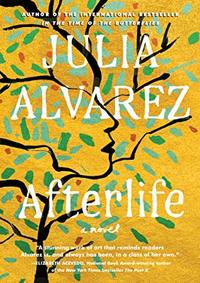 Afterlife (April 7, Algonquin Books) by Julia Alvarez
Afterlife (April 7, Algonquin Books) by Julia Alvarez
Antonia Vega, the immigrant writer at the center of Afterlife, has had the rug pulled out from under her. She has just retired from the college where she taught English when her beloved husband, Sam, suddenly dies. And then more jolts: her bighearted but unstable sister disappears, and Antonia returns home one evening to find a pregnant, undocumented teenager on her doorstep. Antonia has always sought direction in the literature she loves — lines from her favorite authors play in her head like a soundtrack — but now she finds that the world demands more of her than words.
Afterlife is a compact, nimble, and sharply droll novel. Set in this political moment of tribalism and distrust, it asks: What do we owe those in crisis in our families, including — maybe especially — members of our human family? How do we live in a broken world without losing faith in one another or ourselves? And how do we stay true to those glorious souls we have lost?
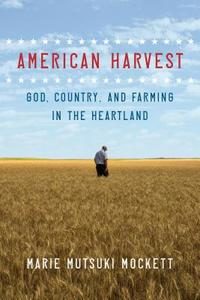 American Harvest: God, Country, and Farming in the Heartland (April 7, Graywolf Press) by Marie Mutsuki Mockett
American Harvest: God, Country, and Farming in the Heartland (April 7, Graywolf Press) by Marie Mutsuki Mockett
For over one hundred years, the Mockett family has owned a seven-thousand-acre wheat farm in the panhandle of Nebraska, where Marie Mutsuki Mockett’s father was raised. Mockett, who grew up in bohemian Carmel, California, with her father and her Japanese mother, knew little about farming when she inherited this land. Her father had all but forsworn it.
In American Harvest, Mockett accompanies a group of evangelical Christian wheat harvesters through the heartland at the invitation of Eric Wolgemuth, the conservative farmer who has cut her family’s fields for decades. As Mockett follows Wolgemuth’s crew on the trail of ripening wheat from Texas to Idaho, they contemplate what Wolgemuth refers to as “the divide,” inadvertently peeling back layers of the American story to expose its contradictions and unhealed wounds. She joins the crew in the fields, attends church, and struggles to adapt to the rhythms of rural life, all the while continually reminded of her own status as a person who signals “not white,” but who people she encounters can’t quite categorize.
American Harvest is an extraordinary evocation of the land and a thoughtful exploration of ingrained beliefs, from evangelical skepticism of evolution to cosmopolitan assumptions about food production and farming. With exquisite lyricism and humanity, this astonishing book attempts to reconcile competing versions of our national story.
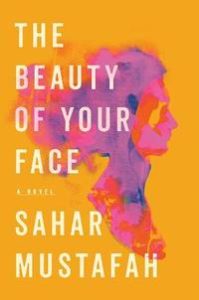 The Beauty of Your Face (April 7, W.W. Norton & Company) by Sahar Mustafah
The Beauty of Your Face (April 7, W.W. Norton & Company) by Sahar Mustafah
A uniquely American story told in powerful, evocative prose, The Beauty of Your Face navigates a country growing ever more divided. Afaf Rahman, the daughter of Palestinian immigrants, is the principal of Nurrideen School for Girls, a Muslim school in the Chicago suburbs. One morning, a shooter, radicalized by the online alt-right, attacks the school.
As Afaf listens to his terrifying progress, we are swept back through her memories: the bigotry she faced as a child, her mother’s dreams of returning to Palestine, and the devastating disappearance of her older sister that tore her family apart. Still, there is the sweetness of the music from her father’s oud, and the hope and community Afaf finally finds in Islam.
The Beauty of Your Face is a profound and poignant exploration of one woman’s life in a nation at odds with its ideals, an emotionally rich novel that encourages us to reflect on our shared humanity. If others take the time to really see us, to look into our face, they will find something indelibly familiar, something achingly beautiful gazing back.
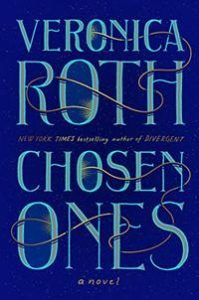 Chosen Ones (April 7, John Joseph Adams) by Veronica Roth
Chosen Ones (April 7, John Joseph Adams) by Veronica Roth
Fifteen years ago, five ordinary teenagers were singled out by a prophecy to take down an impossibly powerful entity wreaking havoc across North America. He was known as the Dark One, and his weapon of choice — catastrophic events known as Drains — leveled cities and claimed thousands of lives. Chosen Ones, as the teens were known, gave everything they had to defeat him.
After the Dark One fell, the world went back to normal… for everyone but them. After all, what do you do when you’re the most famous people on Earth, your only education was in magical destruction, and your purpose in life is now fulfilled?
Of the five, Sloane has had the hardest time adjusting. Everyone else blames the PTSD — and her huge attitude problem — but really, she’s hiding secrets from them… secrets that keep her tied to the past and alienate her from the only four people in the world who understand her.
On the tenth anniversary of the Dark One’s defeat, something unthinkable happens: one of the Chosen Ones dies. When the others gather for the funeral, they discover the Dark One’s ultimate goal was much bigger than they, the government, or even prophecy could have foretold — bigger than the world itself. And this time, fighting back might take more than Sloane has to give.
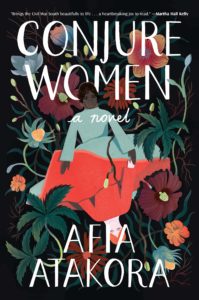 Conjure Women (April 7, Random House) by Afia Atakora
Conjure Women (April 7, Random House) by Afia Atakora
Conjure Women is a sweeping story that brings the world of the South before and after the Civil War vividly to life. Spanning eras and generations, it tells of the lives of three unforgettable women: Miss May Belle, a wise healing woman; her precocious and observant daughter Rue, who is reluctant to follow in her mother’s footsteps as a midwife; and their master’s daughter Varina. The secrets and bonds among these women and their community come to a head at the beginning of a war and at the birth of an accursed child, who sets the townspeople alight with fear and a spreading superstition that threatens their newly won, tenuous freedom.
Magnificently written, brilliantly researched, richly imagined, Conjure Women moves back and forth in time to tell the haunting story of Rue, Varina, and May Belle, their passions and friendships, and the lengths they will go to save themselves and those they love.
 Godshot (April 7, Catapult) by Chelsea Bieker
Godshot (April 7, Catapult) by Chelsea Bieker
Drought has settled on the town of Peaches, California. The area of the Central Valley where fourteen-year-old Lacey May and her alcoholic mother live was once an agricultural paradise. Now it’s an environmental disaster, a place of cracked earth and barren raisin farms. In their desperation, residents have turned to a cult leader named Pastor Vern for guidance. He promises, through secret “assignments,” to bring the rain everybody is praying for.
Lacey has no reason to doubt the pastor. But then her life explodes in a single unimaginable act of abandonment: her mother, exiled from the community for her sins, leaves Lacey and runs off with a man she barely knows. Abandoned and distraught, Lacey May moves in with her widowed grandma, Cherry, who is more concerned with her taxidermy mouse collection than her own granddaughter. As Lacey May endures the increasingly appalling acts of men who want to write all the rules and begins to uncover the full extent of Pastor Vern’s shocking plan to bring fertility back to the land, she decides she must go on a quest to find her mother no matter what it takes. With her only guidance coming from the romance novels she reads and the unlikely companionship of the women who knew her mother, she must find her own way through unthinkable circumstances.
Possessed of an unstoppable plot and a brilliantly soulful voice, Godshot is a book of grit and humor and heart, a debut novel about female friendship and resilience, mother-loss and motherhood, and seeking salvation in unexpected places. It introduces a writer who gives Flannery O’Connor’s Gothic parables a Californian twist and who emerges with a miracle that is all her own.
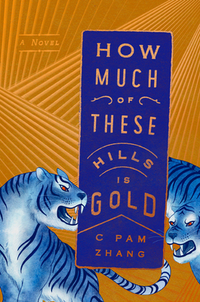 How Much of These Hills is Gold (April 7, Riverhead) by C Pam Zhang
How Much of These Hills is Gold (April 7, Riverhead) by C Pam Zhang
Ba dies in the night; Ma is already gone. Newly orphaned children of immigrants, Lucy and Sam are suddenly alone in a land that refutes their existence. Fleeing the threats of their western mining town, they set off to bury their father in the only way that will set them free from their past. Along the way, they encounter giant buffalo bones, tiger paw prints, and the specters of a ravaged landscape as well as family secrets, sibling rivalry, and glimpses of a different kind of future.
Both epic and intimate, blending Chinese symbolism and re-imagined history with fiercely original language and storytelling, How Much of These Hills Is Gold is a haunting adventure story, an unforgettable sibling story, and the announcement of a stunning new voice in literature. On a broad level, it explores race in an expanding country and the question of where immigrants are allowed to belong. But page by page, it’s about the memories that bind and divide families, and the yearning for home.
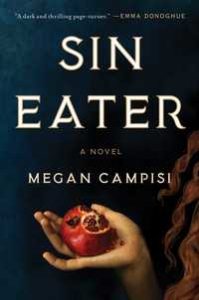 Sin Eater (April 7, Atria) by Megan Campisi
Sin Eater (April 7, Atria) by Megan Campisi
For the crime of stealing bread, fourteen-year-old May receives a life sentence: she must become a Sin Eater — a shunned woman, brutally marked, whose fate is to hear the final confessions of the dying, eat ritual foods symbolizing their sins as a funeral rite, and thereby shoulder their transgressions to grant their souls access to heaven.
Orphaned and friendless, apprenticed to an older Sin Eater who cannot speak to her, May must make her way in a dangerous and cruel world she barely understands. When a deer heart appears on the coffin of a royal governess who did not confess to the dreadful sin it represents, the older Sin Eater refuses to eat it. She is taken to prison, tortured, and killed. To avenge her death, May must find out who placed the deer heart on the coffin and why.
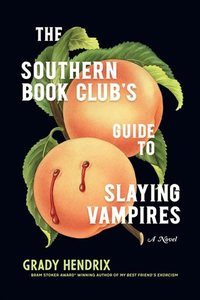 The Southern Book Club’s Guide to Slaying Vampires (April 7, Quirk Books) by Grady Hendrix
The Southern Book Club’s Guide to Slaying Vampires (April 7, Quirk Books) by Grady Hendrix
Patricia Campbell’s life has never felt smaller. Her ambitious husband is too busy to kiss her good-bye in the morning, her kids are wrapped up in their own lives, and she’s always a step behind on thank-you notes and endless chores. The one thing she has to look forward to is her book club, a close-knit group of Charleston women united by their love of true crime and suspenseful fiction.
This predictable pattern is upended when Patricia is viciously attacked by an elderly neighbor, bringing the neighbor’s handsome relative, James Harris, into her life. Sensitive and well-read, James makes Patricia feel things she hasn’t felt in twenty years. But there’s something… off… and then Patricia’s senile mother-in-law insists she knew him back when she was a girl.
When local children go missing, Patricia has reason to believe that James may be more Bundy than Beatnik. But once she and the book club members investigate further, the true monster emerges — and he’s far more terrifying than any serial killer they’ve ever read about.
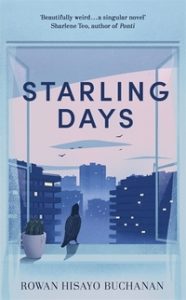 Starling Days (April 7, The Overlook Press) by Rowan Hisayo Buchanan
Starling Days (April 7, The Overlook Press) by Rowan Hisayo Buchanan
On their first date, Mina told Oscar that she was bisexual, vegetarian, and on meds. He married her anyhow. A challenge to be met. She had low days, sure, but manageable. But now, maybe not so much… Mina is standing on the George Washington Bridge late at night, staring over the edge, when a patrol car drives up. She tries to convince the policeman she’s not about to jump, but he doesn’t believe her. Oscar is called to pick her up.
With the idea of leaving New York for London — a place for Mina “to learn the floorplan of this sadness” — Oscar arranges a move. In London, Mina, a classicist, tries grappling with her mental health issues by making lists. Of WOMEN WHO SURVIVED — Penelope, Psyche, Leda. Iphigenia, but only in one of the tellings. Of things that make her HAPPY — enamel coffee cups. But what else? She at last finds a beam of light in Phoebe, and friendship and attraction blossom until Oscar and Mina’s complicated love is tested.
A gorgeously wrought novel, variously about love, mythology, mental illness, Japanese beer, and the times we need to seek out milder psychological climates, Rowan Hisayo Buchanan’s Starling Days — written in exquisite prose rich with lightly ironic empathy — is a complex and compelling work of fiction by a singularly gifted young writer.
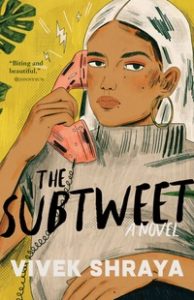 The Subtweet (April 7, ECW Press) by Vivek Shraya
The Subtweet (April 7, ECW Press) by Vivek Shraya
Everyone talks about falling in love, but falling in friendship can be just as captivating. When Neela Devaki’s song is covered by internet-famous artist Rukmini, the two musicians meet and a transformative friendship begins.
But as Rukmini’s star rises and Neela’s stagnates, jealousy and self-doubt creep in. With a single tweet, their friendship implodes, one career is destroyed, and the two women find themselves at the center of an internet firestorm.
Celebrated multidisciplinary artist Vivek Shraya’s second novel is a stirring examination of making art in the modern era, a love letter to brown women, an authentic glimpse into the music industry, and a nuanced exploration of the promise and peril of being seen.
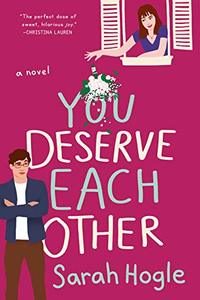 You Deserve Each Other (April 7, G.P. Putnam’s Sons) by Sarah Hogle
You Deserve Each Other (April 7, G.P. Putnam’s Sons) by Sarah Hogle
Naomi Westfield has the perfect fiancé: Nicholas Rose holds doors open for her, remembers her restaurant orders, and comes from the kind of upstanding society family any bride would love to be a part of. They never fight. They’re preparing for their lavish wedding that’s three months away. And she is miserably and utterly sick of him.
Naomi wants out, but there’s a catch: whoever ends the engagement will have to foot the nonrefundable wedding bill. When Naomi discovers that Nicholas, too, has been feigning contentment, the two of them go head-to-head in a battle of pranks, sabotage, and all-out emotional warfare.
But with the countdown looming to the wedding that may or may not come to pass, Naomi finds her resolve slipping. Because now that they have nothing to lose, they’re finally being themselves — and having fun with the last person they expect: each other.
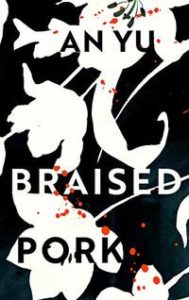 Braised Pork (April 14, Grove Press) by An Yu
Braised Pork (April 14, Grove Press) by An Yu
One autumn morning, Jia Jia walks into the bathroom of her lavish Beijing apartment to find her husband dead. One minute she was breakfasting with him and packing for an upcoming trip, the next, she finds him motionless in their half-full bathtub. Like something out of a dream, next to the tub Jia Jia discovers a pencil sketch of a strange watery figure, an image that swims into Jia Jia’s mind and won’t leave.
The mysterious drawing launches Jia Jia on an odyssey across contemporary Beijing, from its high-rise apartments to its hidden bars, as her path crosses some of the people who call the city home, including a jaded bartender who may be able to offer her the kind of love she had long thought impossible. Unencumbered by a marriage that had constrained her, Jia Jia travels into her past to try to discover things that were left unsaid by the people closest to her. Her journey takes her to the high plains of Tibet, and even to a shadowy, watery otherworld, a place she both yearns and fears to go.
Exquisitely attuned to the complexities of human connection, and an atmospheric and cinematic evocation of middle-class urban China, An Yu’s Braised Pork explores the intimate strangeness of grief, the indelible mysteries of unseen worlds, and the energizing self-discovery of a newly empowered young woman.
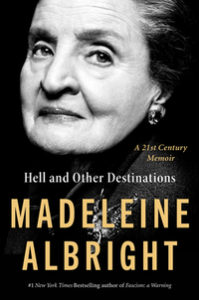 Hell and Other Destinations: A 21st-Century Memoir (April 14, Harper) by Madeleine Albright
Hell and Other Destinations: A 21st-Century Memoir (April 14, Harper) by Madeleine Albright
In 2001, when Madeleine Albright was leaving office as America’s first female secretary of state, interviewers asked her how she wished to be remembered. “I don’t want to be remembered,” she answered. “I am still here and have much more I intend to do. As difficult as it might seem, I want every stage of my life to be more exciting than the last.”
In that time of transition, the former Secretary considered the possibilities: she could write, teach, travel, give speeches, start a business, fight for democracy, help to empower women, campaign for favored political candidates, spend more time with her grandchildren. Instead of choosing one or two, she decided to do it all. For nearly twenty years, Albright has been in constant motion, navigating half a dozen professions, clashing with presidents and prime ministers, learning every day. Since leaving the State Department, she has blazed her own trail—and given voice to millions who yearn for respect, regardless of gender, background, or age.
Hell and Other Destinations reveals this remarkable figure at her bluntest, funniest, most intimate, and most serious. It is the tale of our times anchored in lessons for all time, narrated by an extraordinary woman with a matchless zest for life.
 Kim Jiyoung, Born 1982 (April 14, Liveright) by Cho Nam-Joo, translated by Jamie Chang
Kim Jiyoung, Born 1982 (April 14, Liveright) by Cho Nam-Joo, translated by Jamie Chang
In a small, tidy apartment on the outskirts of the frenzied metropolis of Seoul, Kim Jiyoung ― a millennial “everywoman” ― spends her days caring for her infant daughter. Her husband, however, worries over a strange symptom that has recently appeared: Jiyoung has begun to impersonate the voices of other women ― dead and alive, both known and unknown to her. Truly, flawlessly, completely, she became that very person. As she plunges deeper into this psychosis, Jiyoung’s concerned husband sends her to a psychiatrist, who listens to her narrate her own life story ― from her birth to a family who expected a son, to elementary school teachers who policed girls’ outfits, to male coworkers who installed hidden cameras in women’s restrooms and posted the photos online. But can her doctor cure her, or even discover what truly ails her? Rendered in eerie prose, Kim Jiyoung, Born 1982 announces the arrival of a major international writer.
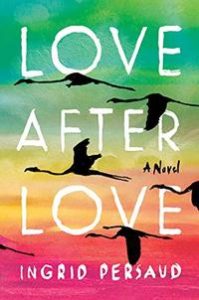 Love After Love (April 14, One World) by Ingrid Persaud
Love After Love (April 14, One World) by Ingrid Persaud
After Betty Ramdin’s husband dies, she invites a colleague, Mr. Chetan, to move in with her and her son, Solo. Over time, the three become a family, loving each other deeply and depending upon one another. Then, one fateful night, Solo overhears Betty confiding in Mr. Chetan and learns a secret that plunges him into torment.
Solo flees Trinidad for New York to carve out a lonely existence as an undocumented immigrant, and Mr. Chetan remains the singular thread holding mother and son together. But soon, Mr. Chetan’s own burdensome secret is revealed, with heartbreaking consequences. Love After Love interrogates love and family in all its myriad meanings and forms, asking how we might exchange an illusory love for one that is truly fulfilling.
In vibrant, addictive Trinidadian prose, Love After Love questions who and how we love, the obligations of family, and the consequences of choices made in desperation.
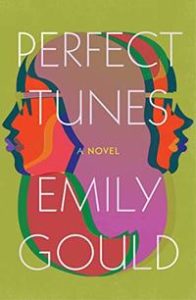 Perfect Tunes (April 14, Avid Reader Press) by Emily Gould
Perfect Tunes (April 14, Avid Reader Press) by Emily Gould
It’s the early days of the new millennium, and Laura has arrived in New York City’s East Village in the hopes of recording her first album. A songwriter with a one-of-a-kind talent, she’s just beginning to book gigs with her beautiful best friend when she falls hard for a troubled but magnetic musician whose star is on the rise. Their time together is stormy and short-lived — but will reverberate for the rest of Laura’s life.
Fifteen years later, Laura’s teenage daughter, Marie, is asking questions about her father, questions that Laura does not want to answer. Laura has built a stable life in Brooklyn that bears little resemblance to the one she envisioned when she left Ohio all those years ago, and she’s taken pains to close the door on what was and what might have been. But neither her best friend, now a famous musician who relies on Laura’s songwriting skills, nor her depressed and searching daughter will let her give up on her dreams.
Funny, wise, and tenderhearted, Perfect Tunes explores the fault lines in our most important relationships, and asks whether dreams deferred can ever be reclaimed. It is a delightful and poignant tale of music and motherhood, ambition and compromise — of life, in all its dissonance and harmony.
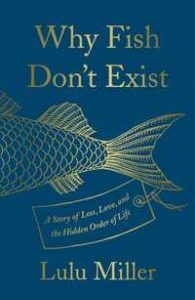 Why Fish Don’t Exist: A Story of Loss, Love, and the Hidden Order of Life (April 14, Simon & Schuster) by Lulu Miller
Why Fish Don’t Exist: A Story of Loss, Love, and the Hidden Order of Life (April 14, Simon & Schuster) by Lulu Miller
David Starr Jordan was a taxonomist, a man possessed with bringing order to the natural world. In time, he would be credited with discovering nearly a fifth of the fish known to humans in his day. But the more of the hidden blueprint of life he uncovered, the harder the universe seemed to try to thwart him. His specimen collections were demolished by lightning, by fire, and eventually by the 1906 San Francisco earthquake — which sent more than a thousand of his discoveries, housed in fragile glass jars, plummeting to the floor. In an instant, his life’s work was shattered.
Many might have given up, given in to despair. But Jordan? He surveyed the wreckage at his feet, found the first fish he recognized, and confidently began to rebuild his collection. And this time, he introduced one clever innovation that he believed would at last protect his work against the chaos of the world.
When NPR reporter Lulu Miller first heard this anecdote in passing, she took Jordan for a fool — a cautionary tale in hubris, or denial. But as her own life slowly unraveled, she began to wonder about him. Perhaps instead he was a model for how to go on when all seemed lost. What she would unearth about his life would transform her understanding of history, morality, and the world beneath her feet.
Part biography, part memoir, part scientific adventure, Why Fish Don’t Exist reads like a fable about how to persevere in a world where chaos will always prevail.
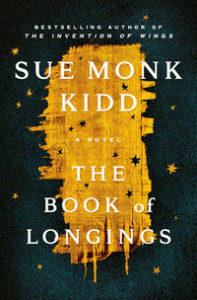 The Book of Longings (April 21, Viking) by Sue Monk Kidd
The Book of Longings (April 21, Viking) by Sue Monk Kidd
In her mesmerizing fourth work of fiction, Sue Monk Kidd takes an audacious approach to history and brings her acclaimed narrative gifts to imagine the story of a young woman named Ana. Raised in a wealthy family with ties to the ruler of Galilee, she is rebellious and ambitious, with a brilliant mind and a daring spirit. She engages in furtive scholarly pursuits and writes narratives about neglected and silenced women. Ana is expected to marry an older widower, a prospect that horrifies her. An encounter with eighteen-year-old Jesus changes everything.
Their marriage evolves with love and conflict, humor and pathos in Nazareth, where Ana makes a home with Jesus, his brothers, and their mother, Mary. Ana’s pent-up longings intensify amid the turbulent resistance to Rome’s occupation of Israel, partially led by her brother, Judas. She is sustained by her fearless aunt Yaltha, who harbors a compelling secret. When Ana commits a brazen act that puts her in peril, she flees to Alexandria, where startling revelations and greater dangers unfold, and she finds refuge in unexpected surroundings. Ana determines her fate during a stunning convergence of events considered among the most impactful in human history.
Grounded in meticulous research and written with a reverential approach to Jesus’s life that focuses on his humanity, The Book of Longings is an inspiring, unforgettable account of one woman’s bold struggle to realize the passion and potential inside her, while living in a time, place, and culture devised to silence her. It is a triumph of storytelling both timely and timeless, from a masterful writer at the height of her powers.
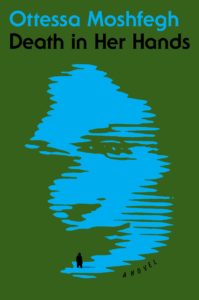 Death in Her Hands (April 21, Penguin Press) by Ottessa Moshfegh
Death in Her Hands (April 21, Penguin Press) by Ottessa Moshfegh
While on her normal daily walk with her dog in the nearby forest woods, our protagonist comes across a note, handwritten and carefully pinned to the ground with a frame of stones. Her name was Magda. Nobody will ever know who killed her. It wasn’t me. Here is her dead body. Our narrator is deeply shaken; she has no idea what to make of this. She is new to this area, having moved here from her longtime home after the death of her husband, and she knows very few people. And she’s a little shaky even on her best days. Her brooding about this note quickly grows into a full-blown obsession, and she begins to devote herself to exploring the possibilities of her conjectures about who this woman was and how she met her fate. Her suppositions begin to find echoes in the real world, and with mounting excitement and dread, the fog of mystery starts to form into a concrete and menacing shape. But as we follow her in her investigation, strange dissonances start to accrue, and our faith in her grip on reality weakens, until finally, just as she seems to be facing some of the darkness in her own past with her late husband, we are forced to face the prospect that there is either a more innocent explanation for all this or a much more sinister one — one that strikes closer to home.
A triumphant blend of horror, suspense, and pitch-black comedy, Death in Her Hands asks us to consider how the stories we tell ourselves both guide us closer to the truth and keep us at bay from it. Once again, we are in the hands of a narrator whose unreliability is well earned, only this time the stakes have never been higher.
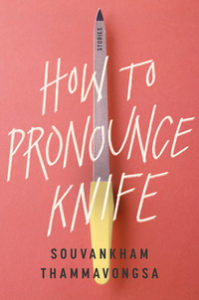 How to Pronounce Knife: Stories (April 21, Little, Brown and Company) by Souvankham Thammavongsa
How to Pronounce Knife: Stories (April 21, Little, Brown and Company) by Souvankham Thammavongsa
In the title story of Souvankham Thammavongsa’s debut collection, a young girl brings a book home from school and asks her father, the only adult in the family who can read English, to help her pronounce a tricky word, a simple exchange with unforgettable consequences. Thammavongsa is a master at homing in on moments like this — moments of exposure, dislocation, and messy feeling that push us right up against the limits of language.
The taut, visceral stories that make up How to Pronounce Knife focus on characters struggling to find their bearings in unfamiliar territory, or shuttling between idioms, cultures, and values. A failed boxer discovers what it truly means to be a champion when he starts painting nails at his sister’s salon. A young woman tries to discern the invisible but immutable social hierarchies that govern relationships at a chicken processing plant. A mother coaches her daughter in the challenging art of worm harvesting.
Charging her clear, direct sentences with immense power, Thammavongsa interrogates what it means to make a living, both in the sense of work and in the sense of creating meaning and identity in precarious circumstances.
Aiming its penetrating gaze at brutality and tenderness, revulsion and arousal, pain and laughter alike, How to Pronounce Knife establishes Thammavongsa as one of the most striking and assured voices of her generation.
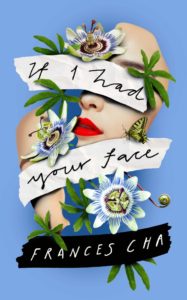 If I Had Your Face (April 21, Ballantine Books) by Frances Cha
If I Had Your Face (April 21, Ballantine Books) by Frances Cha
Kyuri is an achingly beautiful woman with a hard-won job at a Seoul “room salon,” an exclusive underground bar where she entertains businessmen while they drink. Though she prides herself on her cold, clear-eyed approach to life, an impulsive mistake with a client threatens her livelihood.
Her roommate, Miho, is a talented artist who grew up in an orphanage but won a scholarship to study art in New York. Returning to Korea after college, she finds herself in a precarious relationship with the heir to one of the country’s biggest conglomerates.
Down the hall in their building lives Ara, a hair stylist whose two preoccupations sustain her: an obsession with a boy-band pop star, and a best friend who is saving up for the extreme plastic surgery that she hopes will change her life.
And Wonna, one floor below, is a newlywed trying to have a baby that she and her husband have no idea how they can afford to raise in a brutal economic reality.
Together, their stories tell a gripping tale at once unfamiliar and unmistakably universal — their tentative friendships perhaps these women’s only saving grace.
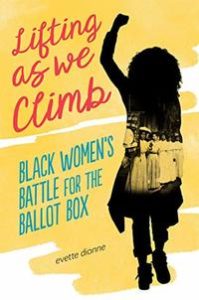 Lifting as We Climb: Black Women’s Battle for the Ballot Box (April 21, Viking Books for Young Readers) by Evette Dionne
Lifting as We Climb: Black Women’s Battle for the Ballot Box (April 21, Viking Books for Young Readers) by Evette Dionne
Susan B. Anthony. Elizabeth Cady Stanton. Alice Paul. The Women’s Rights Convention at Seneca Falls. The 1913 Women’s March in D.C. When the epic story of the suffrage movement in the United States is told, the most familiar leaders, speakers at meetings, and participants in marches written about or pictured are generally white.
The real story isn’t monochromatic. Women of color, especially African American women, were fighting for their right to vote and to be treated as full, equal citizens of the United States. Their battlefront wasn’t just about gender. African American women had to deal with white abolitionist-suffragists who drew the line at sharing power with their black sisters. They had to overcome deep, exclusionary racial prejudices that were rife in the American suffrage movement. And they had to maintain their dignity — and safety — in a society that tried to keep them in its bottom ranks.
Lifting as We Climb is the empowering story of African American women who refused to accept all this. Women in black church groups, black female sororities, black women’s improvement societies and social clubs. Women who formed their own black suffrage associations when white-dominated national suffrage groups rejected them. Women like Mary Church Terrell, a founder of the National Association of Colored Women and of the NAACP; or educator-activist Anna Julia Cooper who championed women getting the vote and a college education; or the crusading journalist Ida B. Wells, a leader in both the suffrage and anti-lynching movements.
Author Evette Dionne, a feminist culture writer and the editor-in-chief of Bitch Media, has uncovered an extraordinary and underrepresented history of black women. In her powerful book, she draws an important historical line from abolition to suffrage to civil rights to contemporary young activists — filling in the blanks of the American suffrage story.
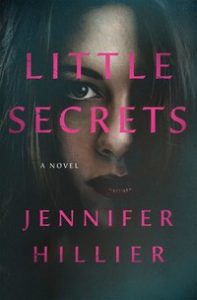 Little Secrets (April 21, Minotaur Books) by Jennifer Hillier
Little Secrets (April 21, Minotaur Books) by Jennifer Hillier
Marin had the perfect life. Married to her college sweetheart, she owns a chain of upscale hair salons, and Derek runs his own company. They’re admired in their community and are a loving family ― until their world falls apart the day their son Sebastian is taken.
A year later, Marin is a shadow of herself. The FBI search has gone cold. The publicity has faded. She and her husband rarely speak. She hires a P.I. to pick up where the police left off, but instead of finding Sebastian, she learns that Derek is having an affair with a younger woman. This discovery sparks Marin back to life. She’s lost her son; she’s not about to lose her husband, too. Kenzie is an enemy with a face, which means this is a problem Marin can fix. Permanently.
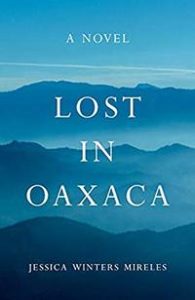 Lost in Oaxaca (April 21, She Writes Press) by Jessica Winters Mireles
Lost in Oaxaca (April 21, She Writes Press) by Jessica Winters Mireles
Once a promising young concert pianist, Camille Childs retreated to her mother’s Santa Barbara estate after an injury to her hand destroyed her hopes for a musical career. She now leads a solitary life teaching piano, and she has a star student: Graciela, the daughter of her mother’s Mexican housekeeper. Camille has been grooming the young Graciela for the career that she herself lost out on, and now Graciela, newly turned eighteen, has just won the grand prize in a piano competition, which means she gets to perform with the LA Philharmonic. Camille is ecstatic; if she can’t play herself, at least as Graciela’s teacher, she will finally get the recognition she deserves.
But there are only two weeks left before the concert, and Graciela has disappeared ― gone back to her family’s village in the mountains of Oaxaca, Mexico. Desperate to bring Graciela back in time for the concert, Camille goes after her, but on the way there, a bus accident leaves her without any of her possessions. Alone and unable to speak the language, Camille is befriended by Alejandro, a Zapotec man who lives in L.A. but is from the same village as Graciela. Despite a contentious first meeting, Alejandro helps Camille navigate the rugged terrain and unfamiliar culture of Oaxaca, allowing her the opportunity to view the world in a different light ― and perhaps find love in the process.
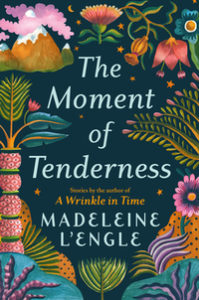 The Moment of Tenderness (April 21, Grand Central) by Madeleine L’Engle
The Moment of Tenderness (April 21, Grand Central) by Madeleine L’Engle
This powerful collection of short stories traces an emotional arc inspired by Madeleine L’Engle’s early life and career, from her lonely childhood in New York to her life as a mother in small-town Connecticut. In a selection of eighteen stories discovered by one of L’Engle’s granddaughters, we see how L’Engle’s personal experiences and abiding faith informed the creation of her many cherished works.
Some of these stories have never been published; others were refashioned into scenes for her novels and memoirs. Almost all were written in the 1940s and ’50s, from Madeleine’s college years until just before the publication of A Wrinkle in Time.
From realism to science-fiction to fantasy, there is something for everyone in this timeless, magical collection.
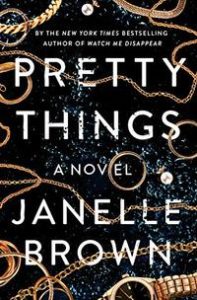 Pretty Things (April 21, Random House) by Janelle Brown
Pretty Things (April 21, Random House) by Janelle Brown
Nina once bought into the idea that her fancy liberal arts degree would lead to a fulfilling career. When that dream crashed, she turned to stealing from rich kids in L.A. alongside her wily Irish boyfriend, Lachlan. Nina learned from the best: Her mother was the original con artist, hustling to give her daughter a decent childhood despite their wayward life. But when her mom gets sick, Nina puts everything on the line to help her, even if it means running her most audacious, dangerous scam yet.
Vanessa is a privileged young heiress who wanted to make her mark in the world. Instead she becomes an Instagram influencer — traveling the globe, receiving free clothes and products, and posing for pictures in exotic locales. But behind the covetable façade is a life marked by tragedy. After a broken engagement, Vanessa retreats to her family’s sprawling mountain estate, Stonehaven: a mansion of dark secrets not just from Vanessa’s past, but from that of a lost and troubled girl named Nina.
Nina’s, Vanessa’s, and Lachlan’s paths collide here, on the cold shores of Lake Tahoe, where their intertwined lives give way to a winter of aspiration and desire, duplicity and revenge.
This dazzling, twisty, mesmerizing novel showcases acclaimed author Janelle Brown at her best, as two brilliant, damaged women try to survive the greatest game of deceit and destruction they will ever play.
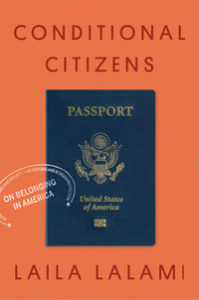 Conditional Citizens: On Belonging in America (April 28, Pantheon) by Laila Lalami
Conditional Citizens: On Belonging in America (April 28, Pantheon) by Laila Lalami
What does it mean to be American? In this starkly illuminating and impassioned book, Pulitzer Prize Finalist Laila Lalami recounts her unlikely journey from Moroccan immigrant to U.S. citizen, using it as a starting point for her exploration of the rights, liberties, and protections that are traditionally associated with American citizenship. Tapping into history, politics, and literature, she elucidates how accidents of birth — such as national origin, race, or gender — that once determined the boundaries of Americanness still cast their shadows today. Throughout the book, she poignantly illustrates how white supremacy survives through adaptation and legislation, with the result that a caste system is maintained, keeping the modern equivalent of white male landowners at the top of the social hierarchy. Conditional citizens, she argues, are all the people whom America embraces with one arm, and pushes away with the other.
Brilliantly argued and deeply personal, Conditional Citizens weaves together the author’s own experiences with explorations of the place of nonwhites in the broader American culture.
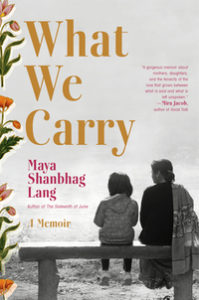 What We Carry: A Memoir (April 28, The Dial Press) by Maya Shanbhag Lang
What We Carry: A Memoir (April 28, The Dial Press) by Maya Shanbhag Lang
Maya Shanbhag Lang grew up idolizing her brilliant mother, an accomplished physician who immigrated to the United States from India and completed her residency, all while raising her children and keeping a traditional Indian home. She had always been a source of support — until Maya became a mother herself. Then, the parent who had once been so capable and attentive turned unavailable and distant. Struggling to understand this abrupt change while raising her own young child, Maya searches for answers and soon learns that her mother is living with Alzheimer’s.
When Maya steps in to care for her, she comes to realize that despite their closeness, she never really knew her mother. Were her cherished stories — about life in India, about what it means to be an immigrant, about motherhood itself — even true? Affecting, raw, and poetic, What We Carry is the story of a daughter and her mother, of lies and truths, of receiving and giving care — and how we cannot grow up until we fully understand the people who raised us.
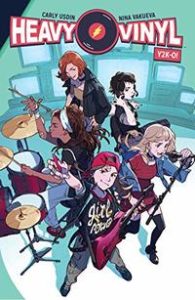 Heavy Vinyl: Y2K-O!* (April 30, BOOM!) by Carly Usdin, illustrated by Nina Vakueva
Heavy Vinyl: Y2K-O!* (April 30, BOOM!) by Carly Usdin, illustrated by Nina Vakueva
It’s 1999 and Chris is living her dream: working at Vinyl Destination by day and fighting for (musical) justice by night in the world’s coolest teen girl vigilante fight club, and playing in a band during her free time. When the girls enter a Battle of The Bands, they learn that the shadowy corporate masters of the music industry plan to destroy the fledgling world of digital music and blame it on Y2K. The critically-acclaimed team of writer Carly Usdin (The Avant-Guards) and Russ Manning Award-nominated artist Nina Vakueva (League of Legends: Ashe) reunite for a follow-up to Heavy Vinyl: Riot on The Radio.
May 2020 Spring New Book Releases
 All Adults Here (May 5, Riverhead) Emma Straub
All Adults Here (May 5, Riverhead) Emma Straub
When Astrid Strick witnesses a school bus accident in the center of town, it jostles loose a repressed memory from her young parenting days decades earlier. Suddenly, Astrid realizes she was not quite the parent she thought she’d been to her three, now-grown children. But to what consequence?
Astrid’s youngest son is drifting and unfocused, making parenting mistakes of his own. Her daughter is pregnant yet struggling to give up her own adolescence. And her eldest seems to measure his adult life according to standards no one else shares. But who gets to decide, so many years later, which long-ago lapses were the ones that mattered? Who decides which apologies really count? It might be that only Astrid’s thirteen-year-old granddaughter and her new friend really understand the courage it takes to tell the truth to the people you love the most.
In All Adults Here, Emma Straub’s unique alchemy of wisdom, humor, and insight come together in a deeply satisfying story about adult siblings, aging parents, high school boyfriends, middle school mean girls, the lifelong effects of birth order, and all the other things that follow us into adulthood, whether we like them to or not.
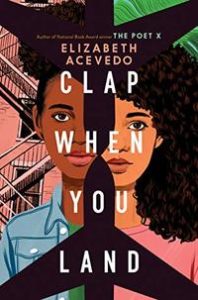 Clap When You Land (May 5, Quill Tree Books) by Elizabeth Acevedo
Clap When You Land (May 5, Quill Tree Books) by Elizabeth Acevedo
Camino Rios lives for the summers when her father visits her in the Dominican Republic. But this time, on the day when his plane is supposed to land, Camino arrives at the airport to see crowds of crying people.
In New York City, Yahaira Rios is called to the principal’s office, where her mother is waiting to tell her that her father, her hero, has died in a plane crash.
Separated by distance — and Papi’s secrets — the two girls are forced to face a new reality in which their father is dead and their lives are forever altered. And then, when it seems like they’ve lost everything of their father, they learn of each other.
 Latitudes of Longing (May 5, One World) by Shubhangi Swarup
Latitudes of Longing (May 5, One World) by Shubhangi Swarup
A spellbinding work of literature, Latitudes of Longing follows the interconnected lives of characters searching for true intimacy. The novel sweeps across India, from an island, to a valley, a city, and a snow desert, to tell a love story of epic proportions. We follow a scientist who studies trees and a clairvoyant who speaks to them; a geologist working to end futile wars over a glacier; octogenarian lovers; a mother struggling to free her revolutionary son; a yeti who seeks human companionship; a turtle who transforms first into a boat and then a woman; and the ghost of an evaporated ocean as restless as the continents. Binding them all together is a vision of life as vast as the universe itself.
A young writer awarded one of the most prestigious prizes in India for this novel, Shubhangi Swarup is a storyteller of extraordinary talent and insight. Richly imaginative and wryly perceptive, Latitudes of Longing offers a soaring view of humanity: our beauty and ugliness, our capacity to harm and love one another, and our mysterious and sacred relationship with nature.
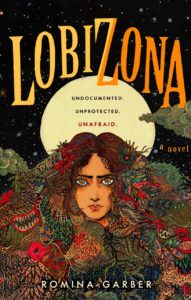 Lobizona* (May 5, Wednesday Books) by Romina Garber
Lobizona* (May 5, Wednesday Books) by Romina Garber
Manuela Azul has been crammed into an existence that feels too small for her. As an undocumented immigrant who’s on the run from her father’s Argentine crime-family, Manu is confined to a small apartment and a small life in Miami, Florida. Until Manu’s protective bubble is shattered.
Her surrogate grandmother is attacked, lifelong lies are exposed, and her mother is arrested by ICE. Without a home, without answers, and finally without shackles, Manu investigates the only clue she has about her past ― a mysterious “Z” emblem ― which leads her to a secret world buried within our own. A world connected to her dead father and his criminal past. A world straight out of Argentine folklore, where the seventh consecutive daughter is born a bruja and the seventh consecutive son is a lobizón, a werewolf. A world where her unusual eyes allow her to belong.
As Manu uncovers her own story and traces her real heritage all the way back to a cursed city in Argentina, she learns it’s not just her U.S. residency that’s illegal… it’s her entire existence.
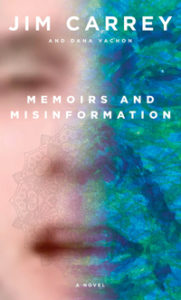 Memoirs and Misinformation (May 5, Knopf) by Jim Carrey and Dana Vachon
Memoirs and Misinformation (May 5, Knopf) by Jim Carrey and Dana Vachon
Meet Jim Carrey. Sure, he’s an insanely successful and beloved movie star drowning in wealth and privilege — but he’s also lonely. Maybe past his prime. Maybe even… getting fat? He’s tried diets, gurus, and cuddling with his military-grade Israeli guard dogs, but nothing seems to lift the cloud of emptiness and ennui. Even the sage advice of his best friend, actor and dinosaur skull collector Nicolas Cage, isn’t enough to pull Carrey out of his slump.
But then Jim meets Georgie: ruthless ingénue, love of his life. And with the help of auteur screenwriter Charlie Kaufman, he has a role to play in a boundary-pushing new picture that may help him uncover a whole new side to himself — finally, his Oscar vehicle! Things are looking up! But the universe has other plans.
Memoirs and Misinformation is a fearless semi-autobiographical novel, a deconstruction of persona. In it, Jim Carrey and Dana Vachon have fashioned a story about acting, Hollywood, agents, celebrity, privilege, friendship, romance, addiction to relevance, fear of personal erasure, our “one big soul,” Canada, and a cataclysmic ending of the world — apocalypses within and without.
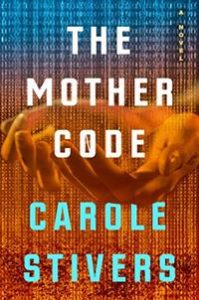 The Mother Code (May 5, Berkley) by Carole Stivers
The Mother Code (May 5, Berkley) by Carole Stivers
It’s 2049, and the survival of the human race is at risk. Earth’s inhabitants must turn to their last resort: a plan to place genetically engineered children inside the cocoons of large-scale robots — to be incubated, birthed, and raised by machines. But there is yet one hope of preserving the human order — an intelligence programmed into these machines that renders each unique in its own right — the Mother Code.
Kai is born in America’s desert southwest, his only companion his robot Mother, Rho-Z. Equipped with the knowledge and motivations of a human mother, Rho-Z raises Kai and teaches him how to survive. But as children like Kai come of age, their Mothers transform too — in ways that were never predicted. When government survivors decide that the Mothers must be destroyed, Kai must make a choice. Will he break the bond he shares with Rho-Z? Or will he fight to save the only parent he has ever known?
In a future that could be our own, The Mother Code explores what truly makes us human — and the tenuous nature of the boundaries between us and the machines we create.
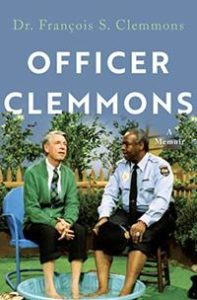 Officer Clemmons: A Memoir (May 5, Catapult) by Dr. François S. Clemmons
Officer Clemmons: A Memoir (May 5, Catapult) by Dr. François S. Clemmons
Officer Clemmons: A Memoir details the incredible life story of François Clemmons, beginning with his early years in Alabama and Ohio, marked by family trauma and loss, through his studies as a music major at Oberlin College, where Clemmons began to investigate and embrace his homosexuality, to a chance encounter with Fred Rogers which changed the whole course of both men’s lives, leading to a deep, spiritual friendship and mentorship spanning nearly forty years.
When he earned the role as “Officer Clemmons” on the award-winning television series Mister Rogers’ Neighborhood, Clemmons made history as the first African American actor to have a recurring role on a children’s program. A new, wide world opened for Francois ― but one which also required him to make painful personal choices, and sacrifices. From New York to the Soviet Union, Berlin to California, Clemmons has performed for audiences around the world, and remains a beloved figure.
Evocative and intimate, and buoyed by its author’s own vivacious, inimitable energy, Officer Clemmons chronicles a historical and enlightening life and career of a man who has brought joy to millions of adults and children, across generations and borders.
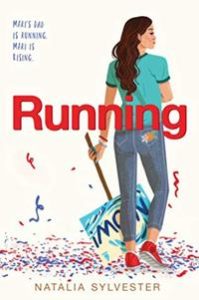 Running (May 5, Clarion Books) by Natalia Sylvester
Running (May 5, Clarion Books) by Natalia Sylvester
In this authentic, humorous, and gorgeously written debut novel about privacy, waking up, and speaking up, Senator Anthony Ruiz is running for president. Throughout his successful political career he has always had his daughter’s vote, but a presidential campaign brings a whole new level of scrutiny to sheltered fifteen-year-old Mariana and the rest of her Cuban American family, from a 60 Minutes-style tour of their house to tabloids doctoring photos and inventing scandals. As tensions rise within the Ruiz family, Mari begins to learn about the details of her father’s political positions, and she realizes that her father is not the man she thought he was.
But how do you find your voice when everyone’s watching? When it means disagreeing with your father — publicly? What do you do when your dad stops being your hero? Will Mari get a chance to confront her father? If she does, will she have the courage to seize it?
 Stray: A Memoir (May 5, Knopf) by Stephanie Danler
Stray: A Memoir (May 5, Knopf) by Stephanie Danler
After selling her first novel — a dream she’d worked long and hard for — Stephanie Danler knew she should be happy. Instead, she found herself driven to face the difficult past she’d left behind a decade ago: a mother disabled by years of alcoholism, further handicapped by a tragic brain aneurysm; a father who abandoned the family when she was three, now a meth addict in and out of recovery. After years in New York City she’s pulled home to Southern California by forces she doesn’t totally understand, haunted by questions of legacy and trauma. Here, she works toward answers, uncovering hard truths about her parents and herself as she explores whether it’s possible to change the course of her history.
Lucid and honest, heart-breaking and full of hope, Stray is an examination of what we inherit and what we don’t have to, of what we have to face in ourselves to move forward, and what it’s like to let go of one’s parents in order to find a peace — and family — of one’s own.
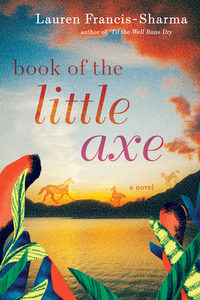 Book of the Little Axe (May 12, Atlantic Monthly Press) by Lauren Francis-Sharma
Book of the Little Axe (May 12, Atlantic Monthly Press) by Lauren Francis-Sharma
In 1796 Trinidad, young Rosa Rendón quietly but purposefully rebels against the life others expect her to lead. Bright, competitive, and opinionated, Rosa sees no reason she should learn to cook and keep house, for it is obvious her talents lie in running the farm she, alone, views as her birthright. But when her homeland changes from Spanish to British rule, it becomes increasingly unclear whether its free black property owners ― Rosa’s family among them ― will be allowed to keep their assets, their land, and ultimately, their freedom.
By 1830, Rosa is living among the Crow Nation in Bighorn, Montana with her children and her husband, Edward Rose, a Crow chief. Her son Victor is of the age where he must seek his vision and become a man. But his path forward is blocked by secrets Rosa has kept from him. So Rosa must take him to where his story began and, in turn, retrace her own roots, acknowledging along the way, the painful events that forced her from the middle of an ocean to the rugged terrain of a far-away land.
 Grown Ups (May 12, Gallery) by Emma Jane Unsworth
Grown Ups (May 12, Gallery) by Emma Jane Unsworth
Jenny McLaine’s life is falling apart. Her friendships are flagging. Her body has failed her. She’s just lost her column at The Foof because she isn’t the fierce voice new feminism needs. Her ex has gotten together with another woman. And worst of all: Jenny’s mother is about to move in. Having left home at eighteen to remake herself as a self-sufficient millennial, Jenny is now in her thirties and nothing is as she thought it would be. Least of all adulthood.
Told in live-wire prose, texts, emails, script dialogue, and social media messages, Grown Ups is a neurotic dramedy of 21st-century manners for the digital age. It reckons with what it means to exist in a woman’s body: to sing and dance and work and mother and sparkle and equalize and not complain and be beautiful and love your imperfections and stay strong and show your vulnerability and bake and box…
But, despite our impossible expectations of women, Emma Jane Unsworth never lets Jenny off the hook. Jenny’s life is falling apart at her own hands and whether or not she has help from her mother or her friends, Jenny is the only one who will be able to pick up the pieces and learn how to, more or less, grow up. Or will she?
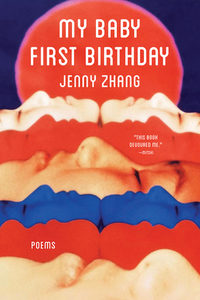 My Baby First Birthday (May 12, Tin House) by Jenny Zhang
My Baby First Birthday (May 12, Tin House) by Jenny Zhang
Radiant and tender, My Baby First Birthday is a collection that examines innocence, asking us who gets to be loved and who has to deplete themselves just to survive. It’s about existence and nonexistence, about being born ― without consent. Jenny Zhang writes about accepting pain, about the way we fetishize womanhood and motherhood, and reduce women to their violations, traumas, and body parts. She questions the way we feminize and racialize nurturing, and live in service of other people’s dreams. Her poems explore the obscenity of patriarchy, whiteness, and capitalism, the violence of rescue and heroism. The magic trick in this book is that despite all these themes, the book never feels like some jeremiad. Zhang uses friendship as a lyric. She seeks tenderness, radiant beauty, and having love for your mistakes. Through all this, she writes about being alone ― really alone, like why-was-I-ever-born alone ― and trying, despite everything, to reach out and touch something ― skin to skin, animal to animal.
 Quotients (May 12, Soho Press) by Tracy O’Neill
Quotients (May 12, Soho Press) by Tracy O’Neill
Jeremy Jordan and Alexandra Chen hope to make a quiet home together but struggle to find a space safe from their personal secrets. For Jeremy, this means leaving behind his former life as an intelligence operative during The Troubles in Northern Ireland. For Alexandra, a high-powered job in image management for whole countries cannot prepare her for her missing brother’s sudden reappearance.
In a culture of limitless surveillance, Jeremy and Alexandra will go to great lengths to protect what is closest to them and answer the question of whether their love will be returned. Spanning decades and continents, their saga brings them into contact with a down-and-out online journalist, shadowy security professionals, and jockeying technology experts, each of whom has a different understanding of whether information really protects us, and how we might build a world worth trusting in our paranoid age.
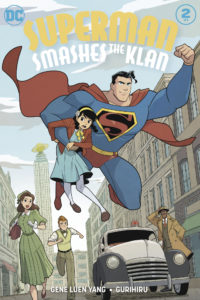 Superman Smashes the Klan* (May 12, DC Zoom) by Gene Luen Yang, Illustrated by Gurihiru
Superman Smashes the Klan* (May 12, DC Zoom) by Gene Luen Yang, Illustrated by Gurihiru
The year is 1946, and the Lee family has moved from Chinatown to Downtown Metropolis. While Dr. Lee is eager to begin his new position at the Metropolis Health Department, his two kids, Roberta and Tommy, are more excited about being closer to the famous superhero Superman!
Tommy adjusts quickly to the fast pace of their new neighborhood, befriending Jimmy Olsen and joining the club baseball team, while his younger sister Roberta feels out of place when she fails to fit in with the neighborhood kids. She’s awkward, quiet, and self-conscious of how she looks different from the kids around her, so she sticks to watching people instead of talking to them.
While the Lees try to adjust to their new lives, an evil is stirring in Metropolis: the Ku Klux Klan. The Klan targets the Lee family, beginning a string of terrorist attacks. They kidnap Tommy, attack the Daily Planet, and even threaten the local YMCA. But with the help of Roberta’s keen skills of observation, Superman is able to fight the Klan’s terror, while exposing those in power who support them — and Roberta and Superman learn to embrace their own unique features that set them apart.
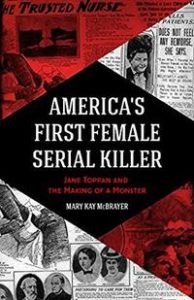 America’s First Female Serial Killer: Jane Toppan and the Making of a Monster (May 19, Mango) by (Book Riot Contributing Editor) Mary Kay McBrayer
America’s First Female Serial Killer: Jane Toppan and the Making of a Monster (May 19, Mango) by (Book Riot Contributing Editor) Mary Kay McBrayer
America’s First Female Serial Killer novelizes the true story of first-generation Irish-American nurse Jane Toppan, born as Honora Kelley. Although all the facts are intact, books about her life and her crimes are all facts and no story. Jane Toppan was absolutely a monster, but she did not start out that way.
When Jane was a young child, her father abandoned her and her sister to the Boston Female Asylum. From there, Jane was indentured to a wealthy family who changed her name, never adopted her, wrote her out of the will, and essentially taught her how to hate herself. Jilted at the altar, Jane became a nurse and took control of her life, and the lives of her victims.
Note: This book was written by Book Riot contributor Mary Kay McBrayer.
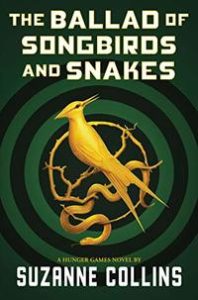 The Ballad of Songbirds and Snakes* (May 19, Scholastic) by Suzanne Collins
The Ballad of Songbirds and Snakes* (May 19, Scholastic) by Suzanne Collins
It is the morning of the reaping that will kick off the tenth annual Hunger Games. In the Capitol, eighteen-year-old Coriolanus Snow is preparing for his one shot at glory as a mentor in the Games. The once-mighty house of Snow has fallen on hard times, its fate hanging on the slender chance that Coriolanus will be able to outcharm, outwit, and outmaneuver his fellow students to mentor the winning tribute.
The odds are against him. He’s been given the humiliating assignment of mentoring the female tribute from District 12, the lowest of the low. Their fates are now completely intertwined — every choice Coriolanus makes could lead to favor or failure, triumph or ruin. Inside the arena, it will be a fight to the death. Outside the arena, Coriolanus starts to feel for his doomed tribute… and must weigh his need to follow the rules against his desire to survive no matter what it takes.
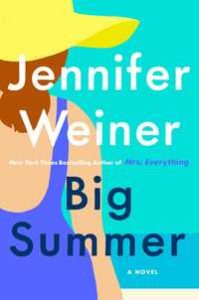 Big Summer (May 19, Atria) by Jennifer Wiener
Big Summer (May 19, Atria) by Jennifer Wiener
#1 New York Times bestselling author Jennifer Weiner is back with a powerful tale of friendship and forgiveness set on Cape Cod during the disastrous wedding of an old friend.
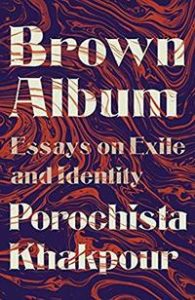 Brown Album: Essays on Exile and Identity (May 19, Vintage) by Porochista Khakpour
Brown Album: Essays on Exile and Identity (May 19, Vintage) by Porochista Khakpour
Novelist Porochista Khakpour’s family moved to Los Angeles after fleeing the Iranian Revolution, giving up their successes only to be greeted by an alienating culture. Growing up as an immigrant in America means that one has to make one’s way through a confusing tangle of conflicting cultures and expectations. And Porochista is pulled between the glitzy culture of Tehrangeles, an enclave of wealthy Iranians and Persians in L.A., her own family’s modest life and culture, and becoming an assimilated American. Porochista rebels — she bleaches her hair and flees to the East Coast, where she finds her community: other people writing and thinking at the fringes. But, 9/11 happens and with horror, Porochista watches from her apartment window as the towers fall. Extremism and fear of the Middle East rises in the aftermath and then again with the election of Donald Trump. Porochista is forced to finally grapple with what it means to be Middle-Eastern and Iranian, an immigrant, and a refugee in our country today.
Brown Album is a stirring collection of essays, at times humorous and at times profound, drawn from more than a decade of Porochista’s work and with new material included. Altogether, it reveals the tolls that immigrant life in this country can take on a person and the joys that life can give.
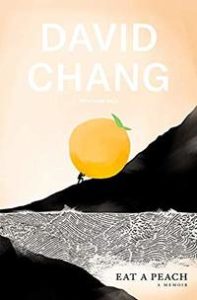 Eat a Peach (May 19, Clarkson Potter) by David Chang and Gabe Ulla
Eat a Peach (May 19, Clarkson Potter) by David Chang and Gabe Ulla
As a young, unspectacular cook, David Chang opened a noodle restaurant in Manhattan’s East Village that should not have survived its first, misbegotten year. But, through sheer stubbornness and a series of utterly reckless choices, he became a chef who the New York Times once described as “the modern equivalent of Norman Mailer or Muhammad Ali.” In this memoir, Chang lays bare his self-doubt and ruminates on mental health. He explains the ideas that guide him and demonstrates how cuisine is a weapon against complacency and racism. Exhibiting the vulnerability of Andre Agassi’s Open and the vivid storytelling of Patti Smith’s Just Kids, this is a portrait of a modern America in which tenacity can overcome anything.
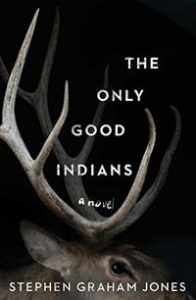 The Only Good Indians (May 19, Saga Press) by Stephen Graham Jones
The Only Good Indians (May 19, Saga Press) by Stephen Graham Jones
Seamlessly blending classic horror and a dramatic narrative with sharp social commentary, The Only Good Indians follows four American Indian men after a disturbing event from their youth puts them in a desperate struggle for their lives. Tracked by an entity bent on revenge, these childhood friends are helpless as the culture and traditions they left behind catch up to them in a violent, vengeful way.
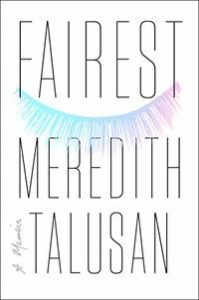 Fairest (May 25, Viking) by Meredith Talusan
Fairest (May 25, Viking) by Meredith Talusan
Fairest is a memoir about a precocious boy with albinism, a “sun child” from a rural Philippine village, who would grow up to become a woman in America. Coping with the strain of parental neglect and the elusive promise of U.S. citizenship, Talusan found childhood comfort from her devoted grandmother, a grounding force as she was treated by others with special preference or public curiosity. As an immigrant to the United States, Talusan came to be perceived as white. An academic scholarship to Harvard provided access to elite circles of privilege but required Talusan to navigate through the complex spheres of race, class, sexuality, and her place within the gay community. She emerged as an artist and an activist questioning the boundaries of gender. Talusan realized she did not want to be confined to a prescribed role as a man, and transitioned to become a woman, despite the risk of losing a man she deeply loved. Throughout her journey, Talusan shares poignant and powerful episodes of desirability and love that will remind readers of works such as Call Me By Your Name and Giovanni’s Room. Her evocative reflections will shift our own perceptions of love, identity, gender, and the fairness of life.
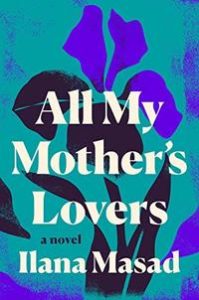 All My Mother’s Lovers (May 26, Dutton) by (Book Riot Contributor) Ilana Masad
All My Mother’s Lovers (May 26, Dutton) by (Book Riot Contributor) Ilana Masad
Intimacy has always eluded twenty-seven-year-old Maggie Krause — despite being brought up by married parents, models of domestic bliss — until, that is, Lucia came into her life. But when Maggie’s mom, Iris, dies in a car crash, Maggie returns home only to discover a withdrawn dad, an angry brother, and, along with Iris’s will, five sealed envelopes, each addressed to a mysterious man she’s never heard of.
In an effort to run from her own grief and discover the truth about Iris — who made no secret of her discomfort with her daughter’s sexuality — Maggie embarks on a road trip, determined to hand-deliver the letters and find out what these men meant to her mother. Maggie quickly discovers Iris’s second, hidden life, which shatters everything Maggie thought she knew about her parents’ perfect relationship. What is she supposed to tell her father and brother? And how can she deal with her own relationship when her whole world is in freefall?
Told over the course of a funeral and shiva, and written with enormous wit and warmth, All My Mother’s Lovers is the exciting debut novel from fiction writer and book critic Ilana Masad. A unique meditation on the universality and particularity of family ties and grief, and a tender and biting portrait of sex, gender, and identity, All My Mother’s Lovers challenges us to question the nature of fulfilling relationships.
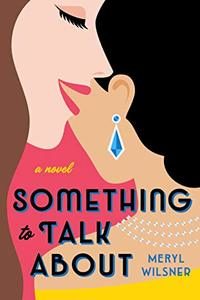 Something to Talk About (May 26, Berkley) by Meryl Wilsner
Something to Talk About (May 26, Berkley) by Meryl Wilsner
Hollywood powerhouse Jo is photographed making her assistant Emma laugh on the red carpet, and just like that, the tabloids declare them a couple. The so-called scandal couldn’t come at a worse time — threatening Emma’s promotion and Jo’s new movie.
As the gossip spreads, it starts to affect all areas of their lives. Paparazzi are following them outside the office, coworkers are treating them differently, and a “source” is feeding information to the media. But their only comment is “no comment”.
With the launch of Jo’s film project fast approaching, the two women begin to spend even more time together, getting along famously. Emma seems to have a sixth sense for knowing what Jo needs. And Jo, known for being aloof and outwardly cold, opens up to Emma in a way neither of them expects. They begin to realize the rumor might not be so off base after all…but is acting on the spark between them worth fanning the gossip flames?
We hope this list of 2020 spring new releases helped you find some great new books to add to your shelves! Remember that preordering is a great way to support authors. And if you love being the first to know about new releases, consider joining Book Riot Insiders to gain access to our New Release Index, exclusive members only podcasts, monthly drawings for free books, and more!
Source : Spring New Releases: 100 Books Hitting Shelves March–May 2020








